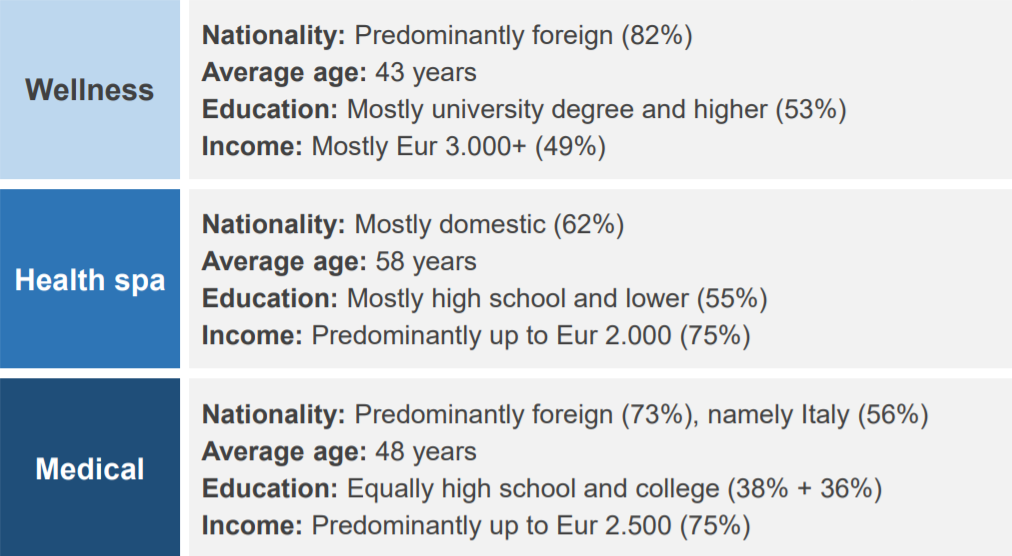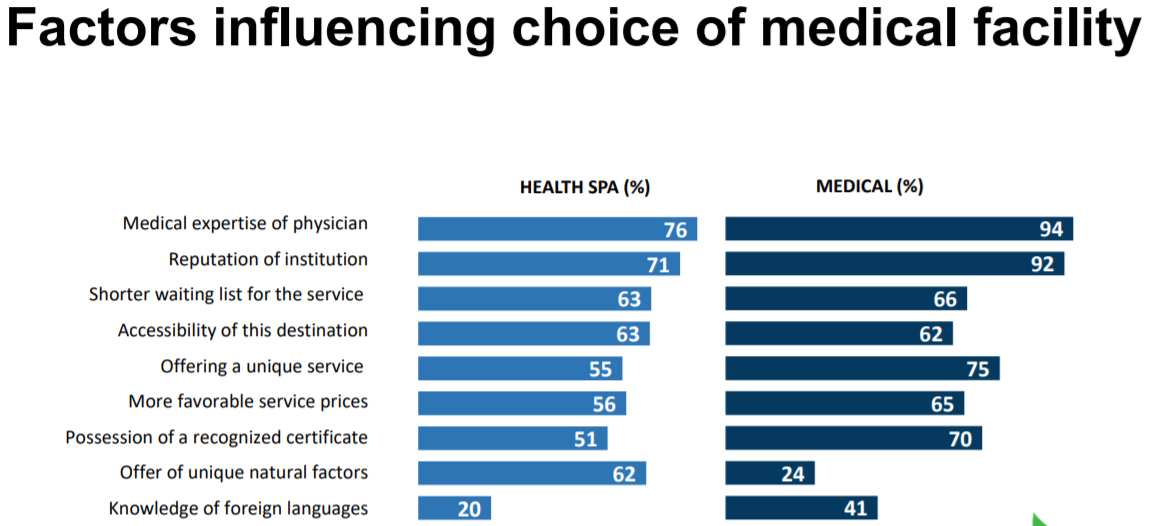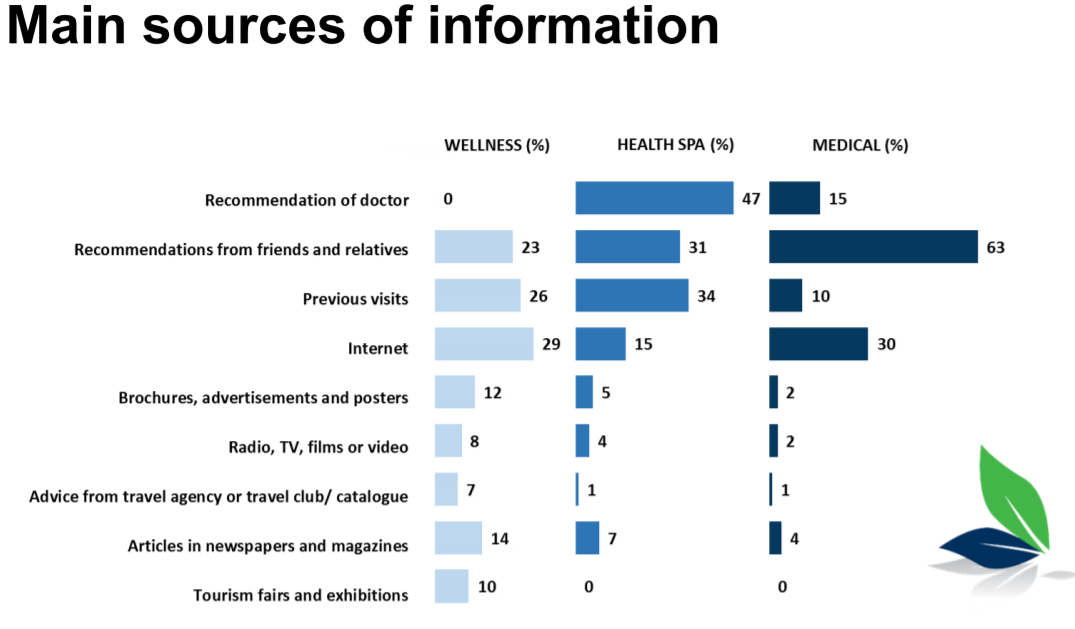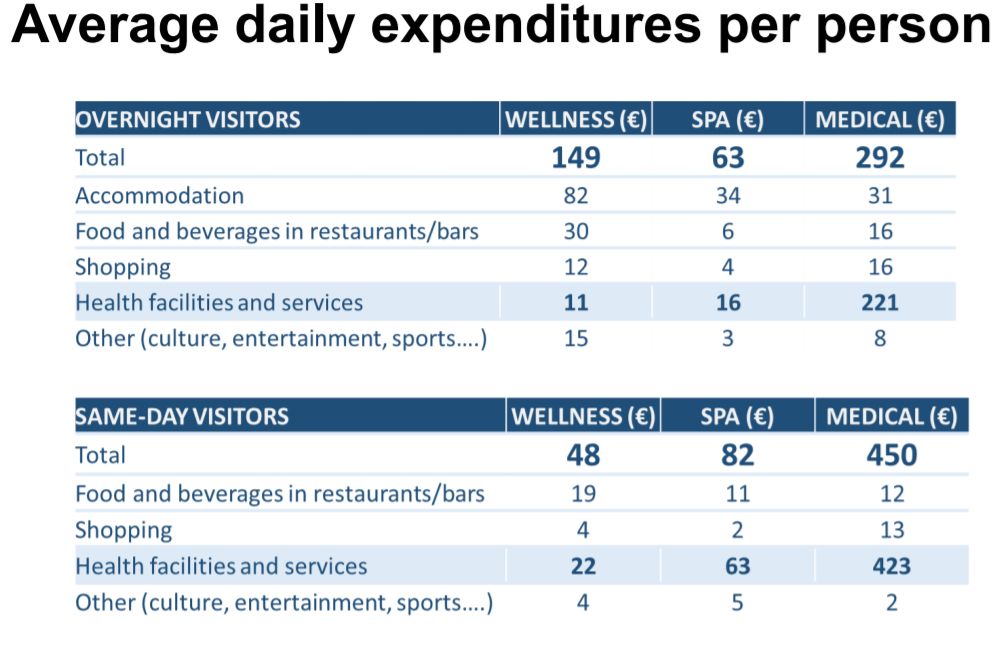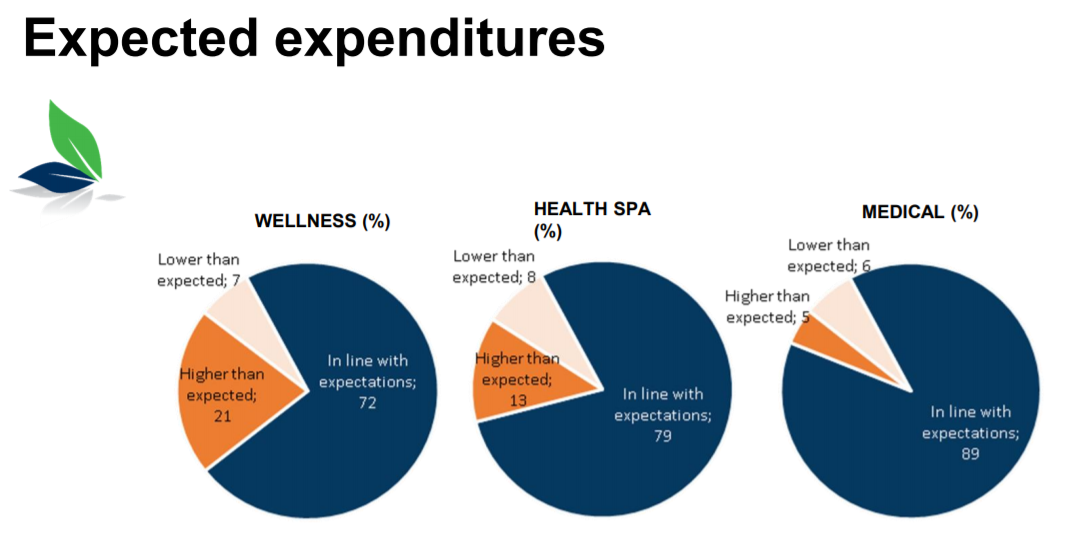Croatia's Bagatin Wins Cosmetic Surgery Clinic of the Year at IMTJ 2019 in Berlin
December 4, 2019 - Bagatin Clinic puts Croatia firmly on the global medical tourism map in Berlin after being named International Cosmetic Surgery Clinic of the Year at the prestigious IMTJ 2019 awards.
A magnificent achievement for Croatian medical tourism last night, as the country's leading clinic, Bagatin, won big at the prestigious IMTJ 2019 awards in Berlin. Organised by the team behind International Medical Travel Journal, the annual awards are the most important in the medical tourism industry, and there was physical representation from an impressive 45 countries at last night's ceremony.
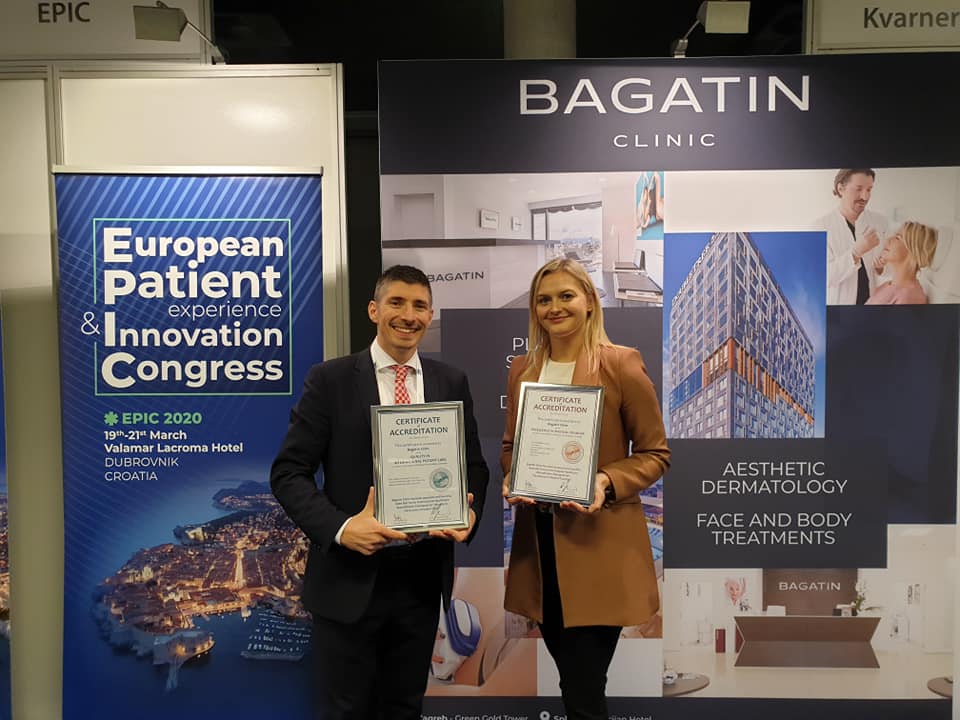
But while winning the title of the world's best International Cosmetic Surgery Clinic of the Year was the highlight of Bagatin's trip to IMTJ 2019, it was by no means the only one.
Earlier in the conference, Bagatin Clinic became the first clinic in Croatia and only the 65th in the world to receive the coveted TEMOS Accreditation - in the fields of Medical Tourism Excellence and Quality of International Patient Care. CEO Ognjen Bagatin and Business Development Manager Andrea Stipanic were on hand to accept the accreditations.
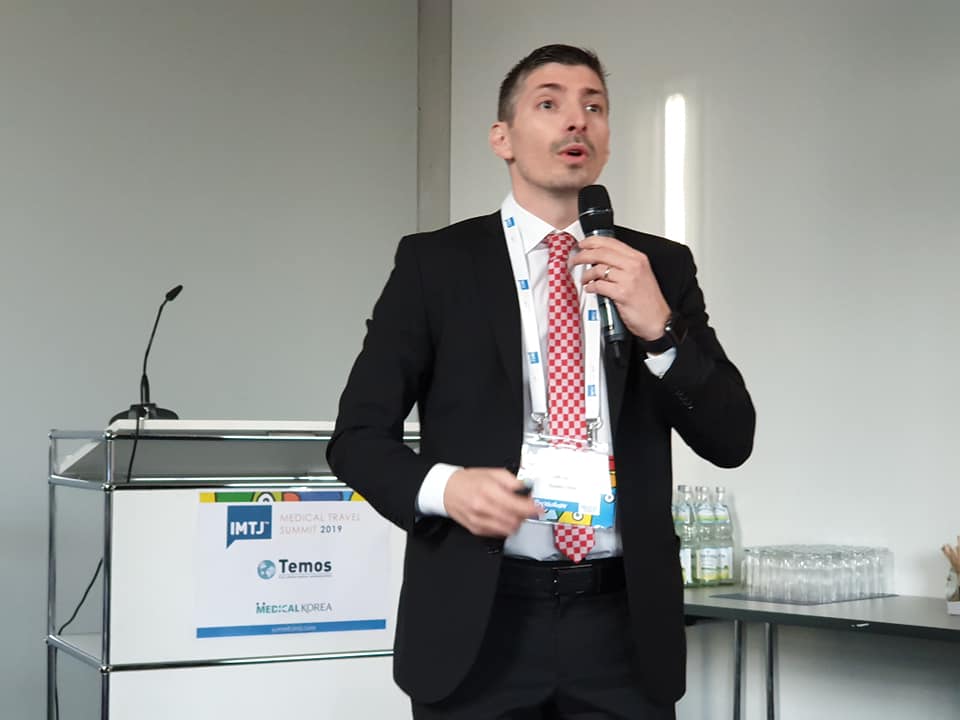
Ognjen Bagatin also gave one of the most inspiring presentations of IMTJ 2019, telling his story of how he grew his clinic from a small operation consisting of just him and his two cosmetic surgeon brothers with a turnover of just 30,000 euro offering just aesthetic surgery in 2008, to over 100 employees in 2018 and revenues of 5.5 million euro with four departments (and 120 employees in 2019).
I have followed the Croatian medical tourism industry closely over the last two years, but IMTJ 2019 was the first time I had seen Bagatin on the global stage, and I was curious to see how a leading Croatian clinic would compare to the global heavyweights. Not only did Bagatin rub shoulders with the best of them, but there were many learning from Bagatin and his best practices. One of the IMTJ judges even commented that the clinic is probably the best global case study for best practices of a clinic.
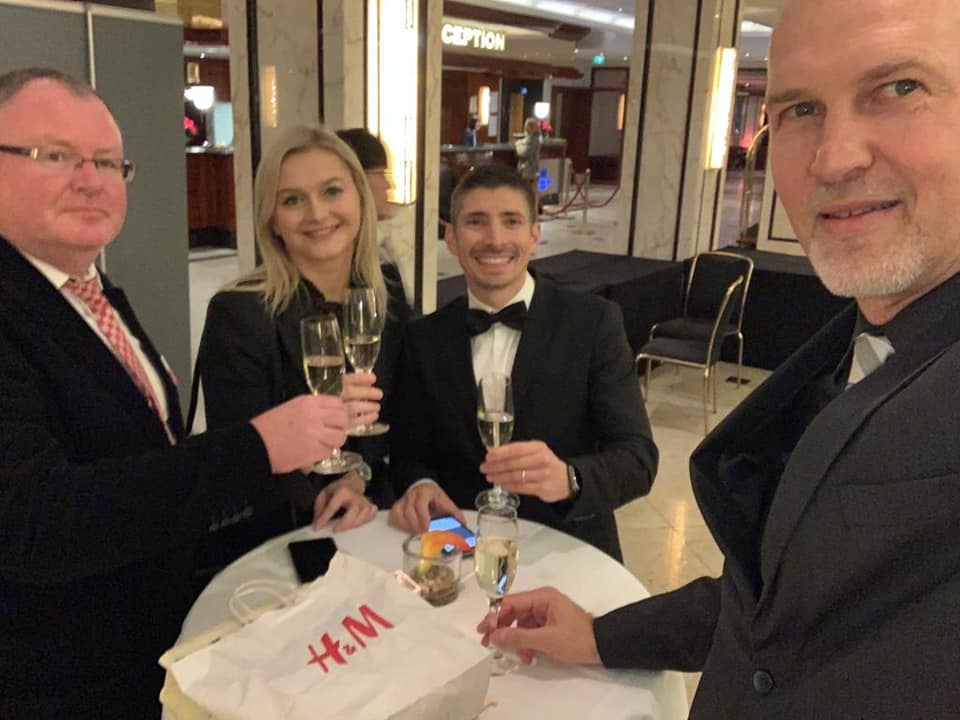
The excellent conference over, it was time for the big night - the annual awards dinner. The Croatian delegation was small, the two Bagatin heroes, Alfred Frankovic from Kvarner Health Cluster, and one fat Brit who wore Bagatin's lucky Croatian tie for the occasion.
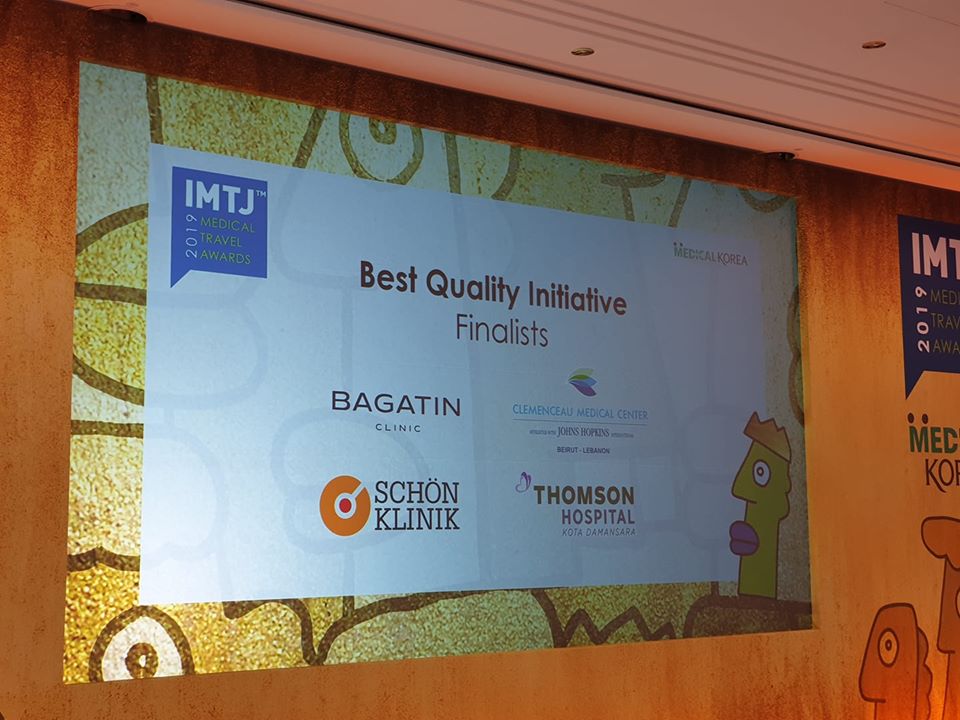
And we did not have long to wait for recognition, with Bagatin Clinic a finalist in the category of Best Quality Initiative.
No victory in that category, but the sweet taste of success was soon to come, as the winner of the International Cosmetic Surgery Clinic of the Year was announced - Bagatin Clinic! It was an honour to be sitting in the front row and to record the moment above.
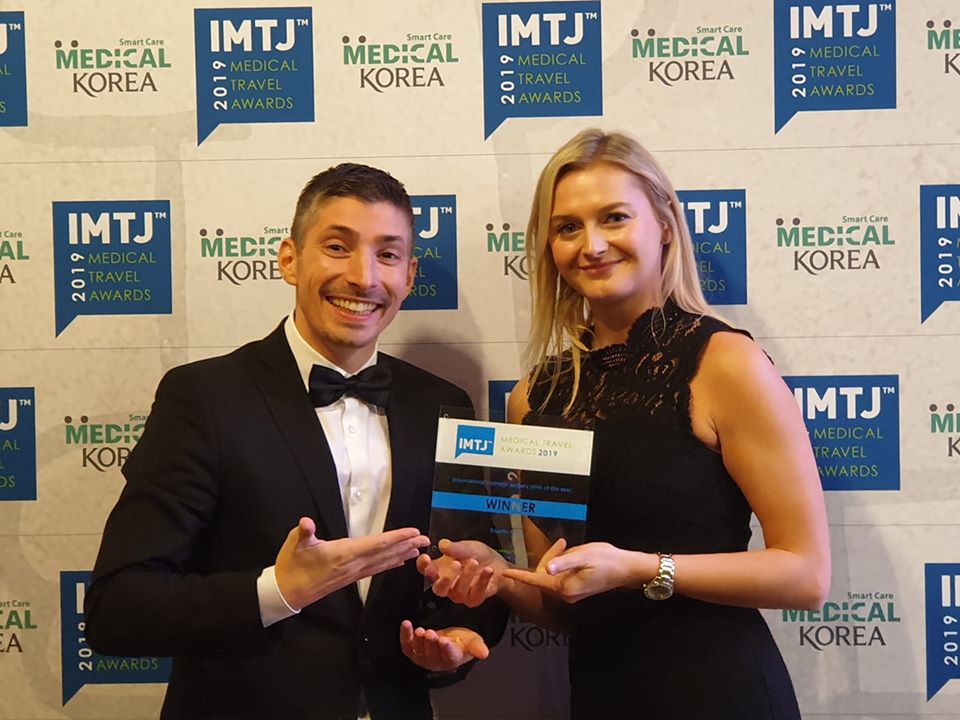
A huge milestone for the Croatian medical tourism industry, and a huge recognition of the efforts of the entire BagaTEAM.
A quick chat with the charismatic CEO a few minutes after the award.
Wonderful stuff - congratulations to the entire BagaTEAM, proof that with the right leadership and plan, Croatia can compete with the very best in the global medical tourism industry. I sometimes compare Ognjen Bagatin to Luka Modric, the midfield dynamo who keeps the Croatian medical tourism industry buzzing. Unlike Modric and the heroics of the 2018 World Cup in Russia, young Ognjen left for Zagreb this morning with his World Cup firmly in his hand.
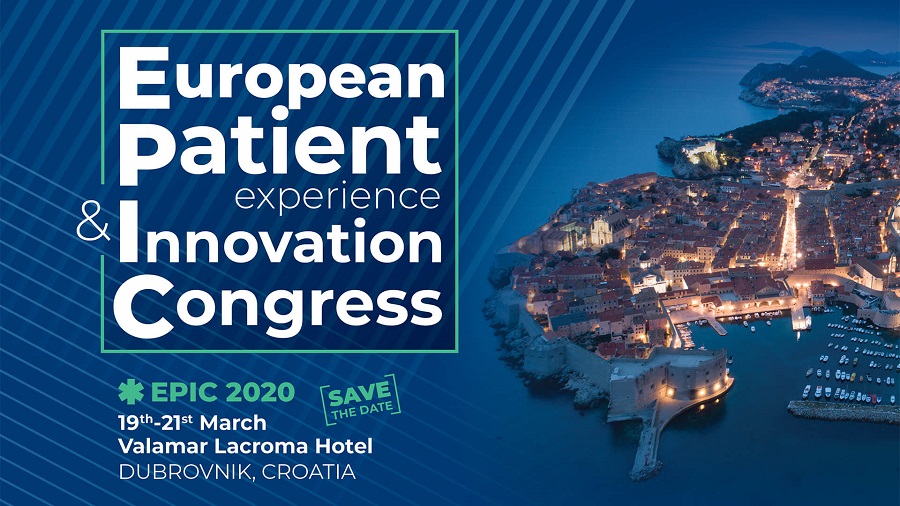
The award is timely for Bagatin and Croatia, as it will shift more focus on the Croatian medical tourism industry. That interest will intensify in March next year, as Bagatin Clinic, together with collaborative international presenter, Cleveland Clinic, will host Europe's first-ever European Patient Experience and Innovation Congress in Dubrovnik. You can learn more about EPIC 2020 on the official website.
For the latest news on the Croatian medical tourism industry, follow the dedicated TCN section.
Croatian Medical Tourism Potential Featured in New York Times
November 20, 2019 - Croatia may be famous for its sun and Adriatic Sea, but as the New York Times notes, there is a new rising star - medical tourism.
Medical tourism experts have been saying for some time that Croatia has the potential to be one of the top ten countries in the world in the industry within ten years. And it seems that the message is spreading, with the New York Times the latest international publication to talk of a new focus in tourism excellence in the Adriatic country famous for its pristine coast and more than 1,000 islands.
Officials estimate that some 10% of tourists to Croatia come for healthcare. On average they spend almost four times more in the country than other tourists, at almost 300 euros ($332.01) a day.
"We see the health tourism as our key product for strengthening our offer and income before and after the packed summer season as health tourists spend more than the summer holiday-makers," said Slavija Jacan Obratov from the Croatian state tourism board HTZ.
While I think that 10% number is a little generous, as it would account for 2 million of the 20 million tourists this year, there are encouraging signs that Croatian medical tourism stakeholders are getting its act together. The recent Crikvenica International Health Tourism conference, CIHT 2019, was the most cohesive conference I have been to in a while (learn more in Croatian Medical Tourism Stakeholders Beginning to Gel at CIHT 2019).
You can read the New York Times article in full here.
A key driving force for change and greater international visibility has been Bagatin Clinic from Zagreb and Split, the leading clinic in the region, and easily the most active Croatian medical tourism business on the international circuit. Not content with merely promoting his own clinic, CEO Ognjen Bagatin is working tirelessly to put Croatia on the global map for medical tourism. His most ambitious project yet is EPIC 2020, the first European Patient Experience and Innovation Conference, to be held in Dubrovnik in March, 2020. Organised by his own Bagatin Clinic, with collaborative international presenter, Cleveland Clinic, the conference has already has some renowned speakers confirmed, including Joe Sweet, Director of International Development and Experience at Cleveland Clinic; Lori Kondas, Executive Director for the Office of Patient Experience for the Cleveland Clinic Health System; Mario Skugar, Clinical Assistant Professor of Medicine CCLCM of CWRU and Director of Education- Cleveland Clinic; Keith Pollard, Editor in Chief of International Medical Travel Journal; and Irving Stackpole, President of Stackpole & Associates. To learn more about EPIC 2020, click here.
To learn more about why Croatia is one of the top emerging medical tourism destinations in Europe, follow the dedicated TCN medical tourism section.
Successful Businesses Tell Success Stories: Bagatin Clinic Reaches Argentina
November 17, 2019 - Black Peel Mask treatments come to Croatia, as Bagatin Clinic extends its message to Argentina.
The more I write about Croatia and the longer I live here, the more amazing successes and untold stories I discover. While many are emigrating and complaining of the lack of opportunity, I find that the opposite is true, but there is a reason for that disconnect.
Very few people are telling their stories or sharing their success.
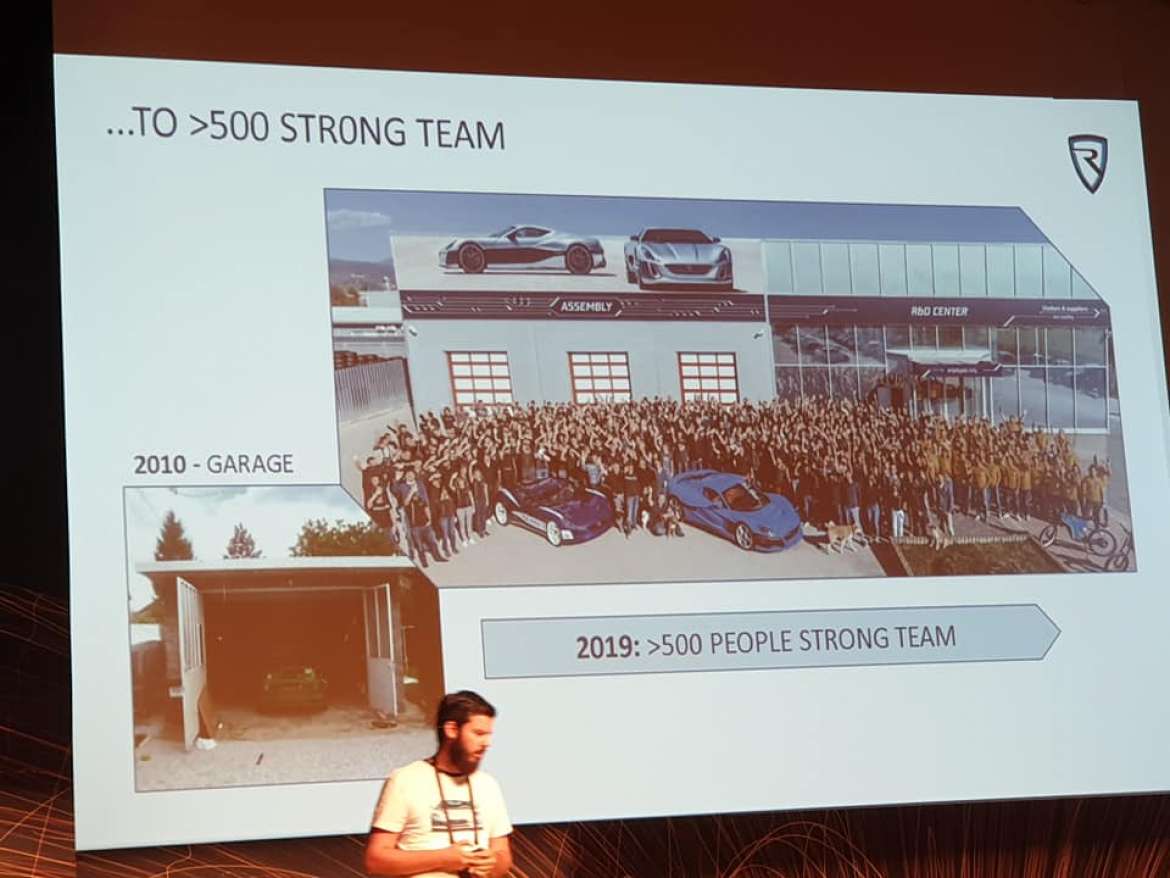
One exception to this is Mate Rimac, of the phenomenally successful Rimac Automobili. Pictured about at the Entrepreneurial Mindset conference in Zagreb, where many of Croatia's top entrepreneurial names shared strories of their successes - and failures - in an inspirational day for budding entrepreneurs in Croatia. Just listening to both the speakers and the participants talking about their businesses made me realise just how much positivity and success there was in Croatia.
If only people knew about it all...
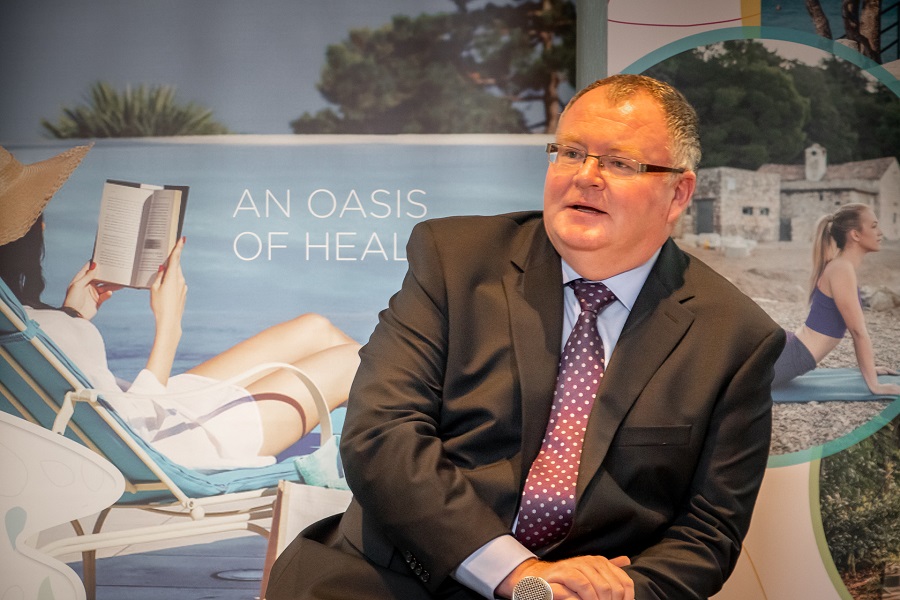
It is the same with the Croatian medical tourism industry. I was recently asked to speak at the Crikvenica International Health Tourism conference in Selce, with the topic of giving my reflections as a foreign resident and journalist on the potential and the reality of Croatian medical health tourism. While it was an honour to be invited, I was a little surprised. My knowledge of the medical tourism is limited, but on reflection, I realised that the pool of medical tourism journalists in general is very limited.
And not just in Croatia, but on a global level, which is surprising for such a major - and rapidly expanding - tourism niche. It was more than a big surprise for TCN to win an award at the inaugural Medical Travel Media Awards in Kuala Lumpur, for example.
The fact is that there are very few people focusing on writing or telling the stories - at least the positive ones. Bad news sells much better than good news, but the less good news that is told, the less people will know about it. That is why I am ultimately very positive about Croatia's future, as I can see that the seeds being planted are very positive - we just need to tell people more about it.
And so too with the medical tourism industry.
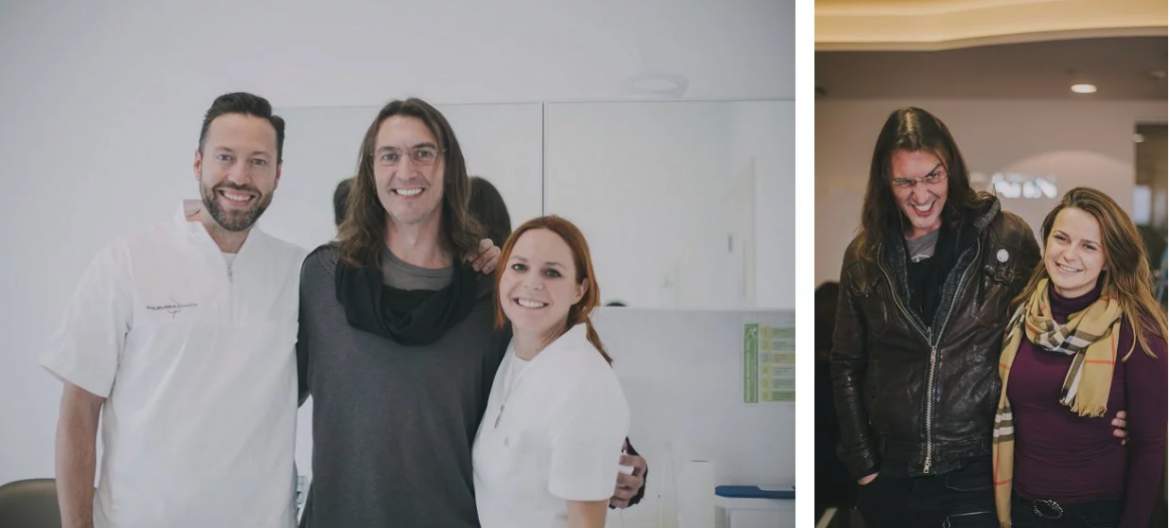
The best promotion, of course, is by word of mouth from a happy client, especially testimonials which appear online in the form of a well-written story. I have written before about Carl's Story, which remains to me the absolute best advert from Croatian tourism - medical or otherwise - especially as it took place out of season. An American citizen whose life was literally transformed by a trip to Bagatin Clinic in Zagreb, where his complete new set of teeth inserted during 10 days over Advent in Zagreb not only gave him the trip of a lifetime and complete self-confidence, but also saved him about $35,000 once the trip costs for him and his friend had been paid. It is one of the best stories I have come across, and I encourage you to read it.
Bagatin Clinic is not only the leading clinic in the region, but also the best at telling its story - one of the reasons it has won prestigious international marketing awards. And so it was somehow no surprise to learn from my Facebook feed this morning that Bagatin is now offering Black Peel Mask treatments in Croatia - information I learned from a health portal in Argentina.
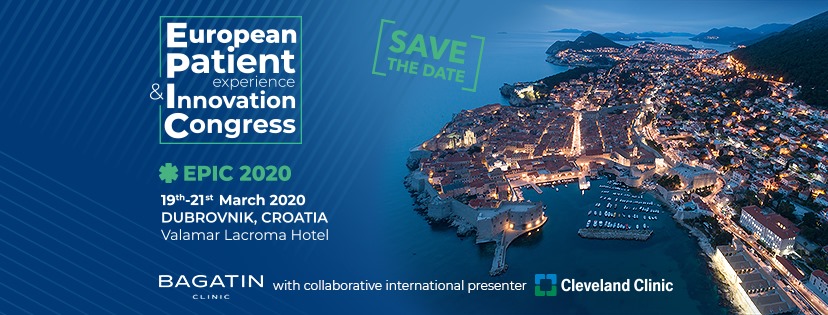
Bagatin is keen to tell the world not just about its own services, but also to raise awareness of the potential of Croatian health tourism in general. A giant step for a small clinic will be taken in March, when Bagatin Clinic, with collaborative international partner, Cleveland Clinic, will host the first ever European Patient Experience and Innovation Congress, EPIC 2020, to be held in Dubrovnik in March. You can learn more from the official website.
Now THAT will be quite a story to tell.
For more on the Croatian medical tourism story, follow the dedicated TCN section.
Croatian Health Tourism TOMAS 2018 Visitor Survey Presented at CIHT 2019
Neda Telisman-Kosuta gave an excellent overview of the findings of the comprehensive survey, TOMAS Croatian Health Tourism 2018: Attitudes and Expenditures of Visitors to Croatia, at the 7th Crikvenica International Health Tourism conference in Selce on November 8, 2019.
It was a Croatian health tourism conference which had everything. Suberb coastal location in the village of Selce, near Crikvenica, excellent organisation, superb speakers, great networking, fine entertainment - and crucially, concrete signs that the key stakeholders of the Croatian health tourism industry were beginning to gel. You can learn more about CIHT 2019 in the comprehensive overview already presented on TCN.
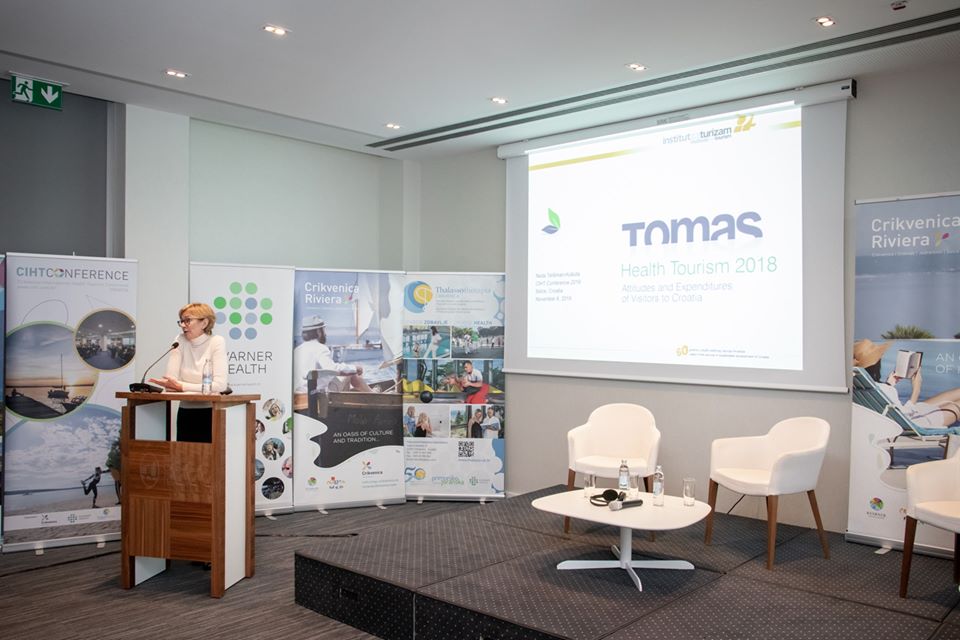
The presentations ranged from the practical to the thought-provoking, as well as the majority which were backed up with concrete and relevant data. Nowhere was this more true than with the detailed presentation given by Neda Telisman-Kosuta from the Institute of Tourism in Zagreb. Her overview of the main findings of the TOMAS Croatian Health Tourism 2018: Attitudes and Expenditures of Visitors to Croatia survey were detailed and well-presented.
Some highlights:
Scope: Wellness, health spa and medical segments
Instrument: Structured questionnaire
Data collection: Personal interview with users (CAPI)
Sample size: 2.540 interviews at 43 facilities
Surveying period: July - December 2018
The study separated out three sectors of Croatian health tourism - wellness, health spa, and medical. As you can see above, the end user varies considerably between the three.
I was surprised that price did not figure more prominently in the decision-making process, but it was encouraging to see expertise and reputation as such key factors. Croatian health tourism excels in both.
One of the most interesting findings was in the source of information used by patients to find their health tourism solution in Croatia. Word of mouth is the best advertising one can have, and the high percentage of personal recommendation and doctor recommendation, as well as repeat business, are very good indicators for the future.
By contrast, the almost total absence of traction from advertising, media and tourism fairs points to work to be done in this field.
The average daily spend varied considerably between the three sectors. By way of comparison, the average daily spend in regular tourism in Croatia is 79 euro.
And visitors were generally satisfied with the expectations of the financial costs. Overall experience satisfaction was also very high, with the only areas which rated less than excellent being shopping possiblities and local transport, as well as the innovation of the offer in the health spa sector. But very positive and encouraging overall.
You can learn more about the work of the Institute for Tourism from the official website. The full report is available in Croatian (only, I think) from the Zagreb Tourist Board, and possibly elsewhere.
To follow the latest from the Croatian health tourism industry, follow the dedicated TCN section.
Croatian Medical Tourism Stakeholders Beginning to Gel at CIHT 2019
CIHT 2019, the seventh edition of the Crikvenica International Health Tourism conference concluded on November 8, 2019. Outstanding from start to finish, did it contain a watershed transformation from potential to the beginnings of realisation for the Croatian medical tourism industry?
Full disclosure - this has been the best week in the history of TCN. Two new writers hired, our first intern programme with the University of Zagreb agreed, two big contracts signed, agreement with exciting partners to start our first EU-funded project, and two outstanding conferences. G2.5, the diaspora conference in Zagreb at the beginning of the week was one of the best I have been to in Croatia in terms of contacts and business done (see the conference report here), and I really wasn't expecting a better conference for quite some time. But then, just two days later...
CIHT 2019, the annual health tourism conference which has become a signature event for the very proactive Kvarner Health Cluster, was not only filled with an exceptional list of engaging and diverse speakers, but the levels of cooperation and joint initiatives were at a level visibly more noticeable than ever before.
CIHT 2019 was held in the village of Selce, a very short drive from Crikvenica. The reason, I suspect, was in honour of one of the true Croatian success stories in any sector, the outstanding 30-year success of the husband and wife team, Drs Ivan and Vlasta Brozicevic and their world-renowned Terme Selce facility, which has grown both in size and quality since its inception in 1989, and which includes no less than 120 Olympic medalists among its satisfied patients. I will be returning to Selce later in the year to do some in-depth features on that 30-year journey, which continues today. The Brozicevics were presented with a special award (see above) before the conference got properly underway, and there were few dry eyes in the house as Dr Vlasta took us through her inspirational journey of excellence and constant learning.
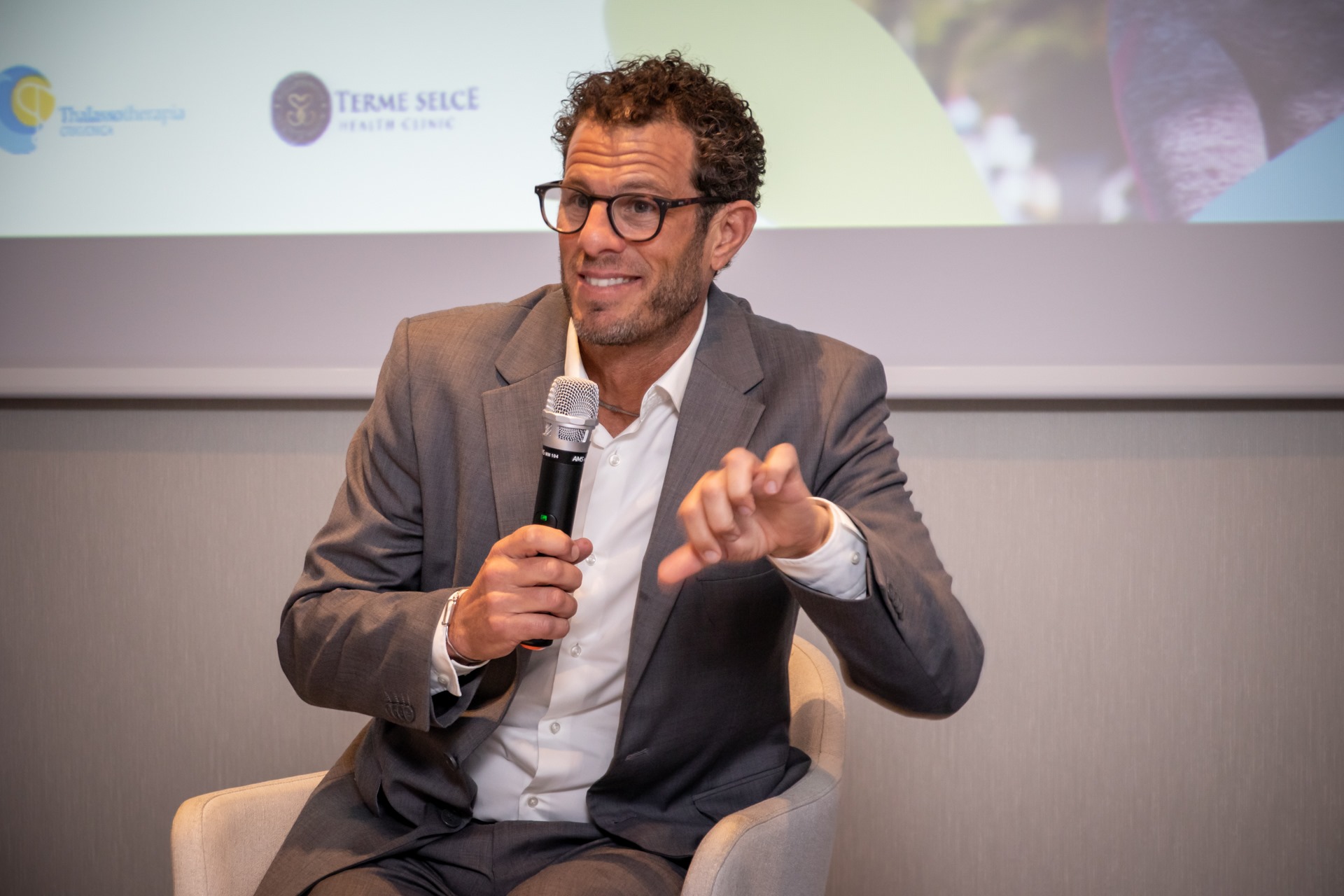
A very tough act to follow, but a challenge taken on with relish by the next speaker, one of the world's most in-demand tourism conference speakers, Doug Lansky. And it did not take long to realise why. His keynote session, called Successful Tourism, was laced with great tips for Croatia, both in directions to go and to avoid, and I will dedicated a later article to Lansky's presentation and the two subsequent workshops he conducted in the afternoon session.
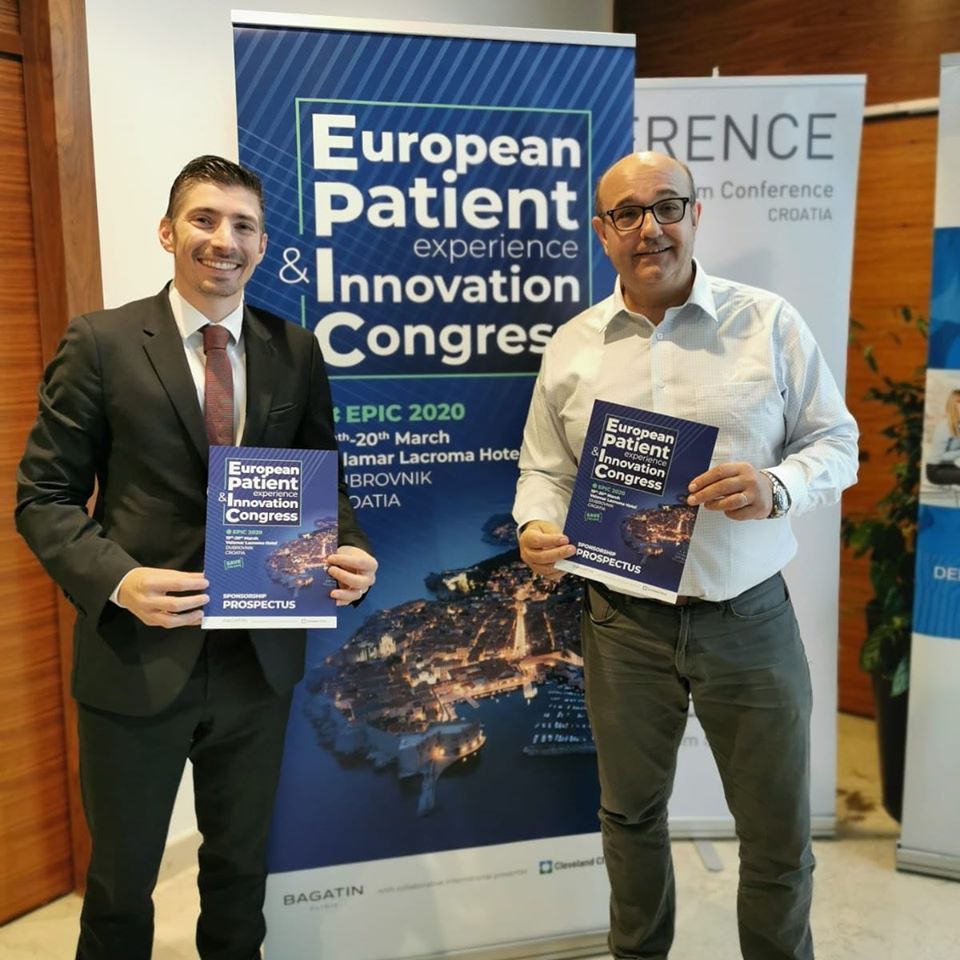
One of the strengths of CIHT has always been that it aims high in terms of the quality of the speakers. And there are few higher places in the healthcare industry that Cleveland Clinic and Mayo Clinic, the two leading medical facilities in the world. Super Mario Skugor, Director of Education at Cleveland and himself a Croat, was followed by Rahul Kashyap, Assistant Professor of Anesthesiology at Mayo Clinic. Kashyap gave a comprehensive overview of the Mayo model of care, focusing on quality education and research collaboration.
Cleveland Clinic and Mayo Clinic presenting together, just after one of the world's top tourism speakers, all in a little village on the Kvarner coast in early November. Pretty impressive.
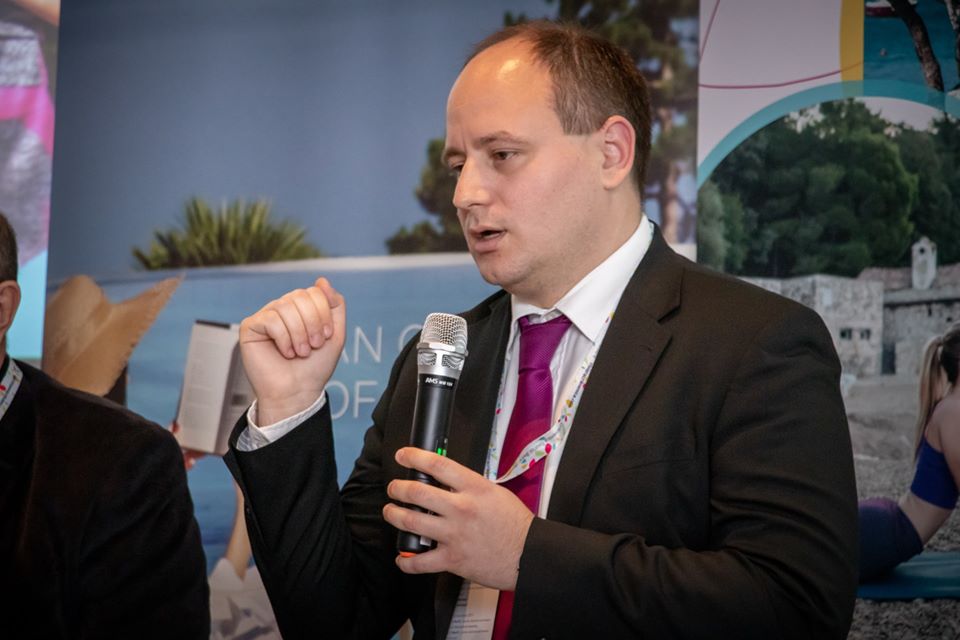
More was to come, indeed the most - at least for me - significant and encouraging presentation of the two-day event. Not perhaps for the content after such a high-quality start, but in terms of openness, honesty and willingness to engage. For the speaker was a politician.
Deputy Health Minister Mate Car's presentation was entitled The Interactions of Policy, Strategy and Health Tourism, but it was when he started talking about the state of Croatia's health tourism efforts, dividing them into three slides looking at the good, the bad and the ugly, that I saw for the first time (and I have been to many health conferences in the last two years) what I had heard from several in the industry - here was a senior official who was very interested in engaging with the other stakeholders, calling together meetings to hear their ideas and frustrations, even publicly publishing his official mobile number to make himself even more accessible. While 95% of ministers and deputy ministers tend to leave conferences as soon as the PR photo shoot and opening speeches are done, Car not only stayed until the end and was a very active participant, but he even found time to chat to me for over an hour on a wide range of issues concerning health tourism, the role of government and Croatia in general. It was very refreshing to see.
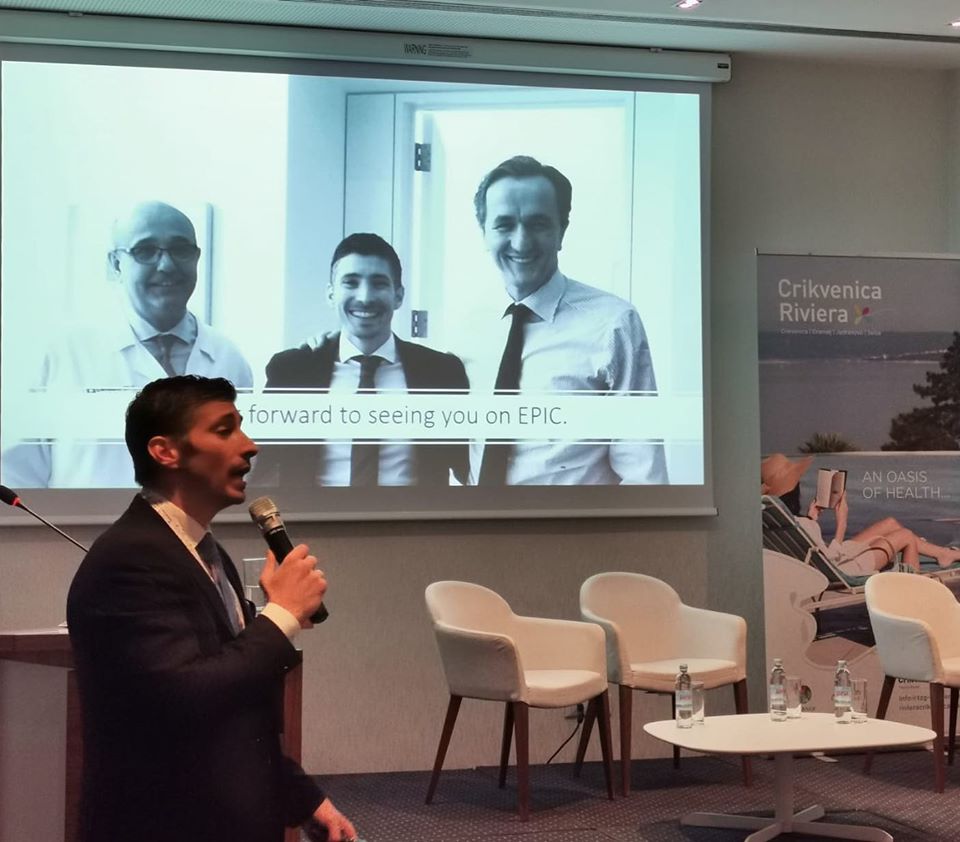
Car's relationship with one of the drivers of progress in the industry, Ognjen Bagatin, CEO of Bagatin Clinic, has been key. Bagatin was also a speaker on the first day, presenting arguably the most ambitious medical tourism conference in Croatia next March - the first-ever European Patient Experience and Innovation Conference, to be held in Dubrovnik. Against a backdrop of Bagatin with Cleveland Clinic CIHT speaker Super Mario and Cleveland CEO Tom Mihaljevic, Bagatin introduced his vision of EPIC 2020, a groundbreaking conference which his Bagatin Clinic is the main organiser.
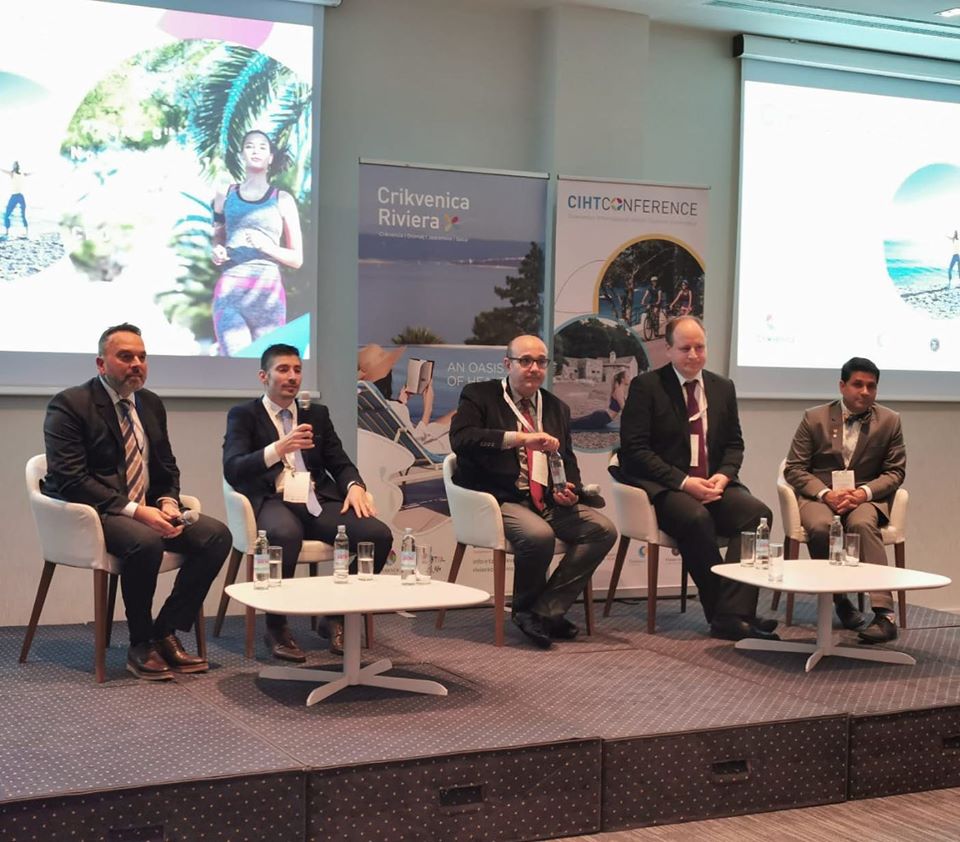
Having observed the Croatian medical tourism industry for two years now, Ognjen Bagatin strikes me as being akin to the Luka Modric of the Croatian medical tourism industry, a midfield dynamo pulling the strings and connecting and lifting the entire team. Here he is, fielding questions with other speakers including Cleveland and Mayo Clinics and Deputy Minister Car.
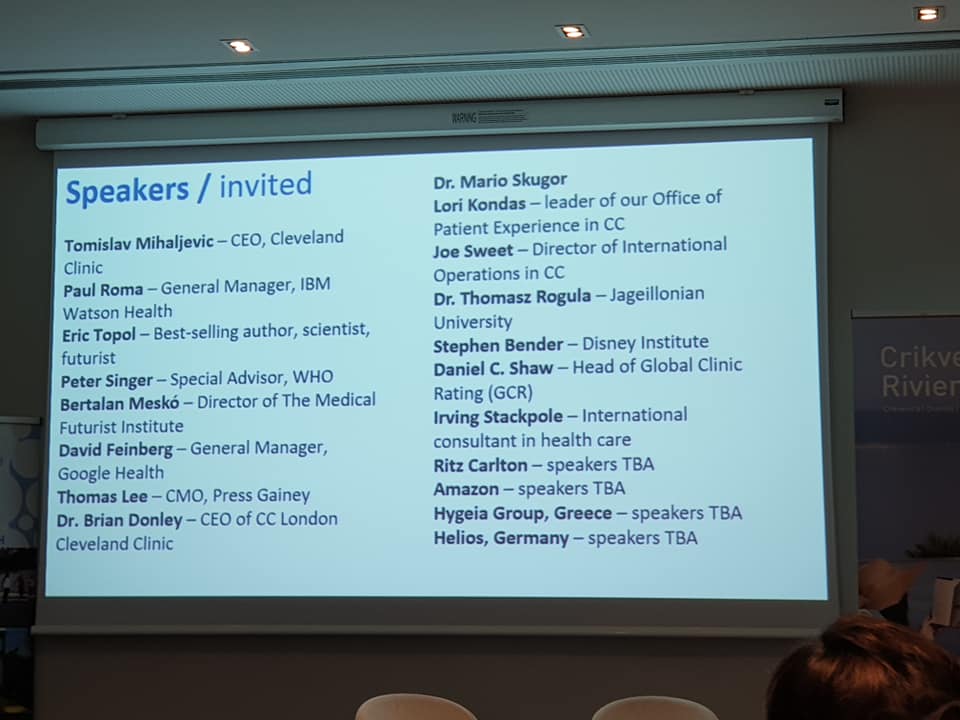
He is certainly aiming high with EPIC, and if we stick with the football analogy, EPIC Dubrovnik could be the perfect World Cup Final stadium for medical tourism speakers. Bagatin showed the list of invited speakers, several of whom have already confirmed. You can learn more details about the EPIC conference on the official website.
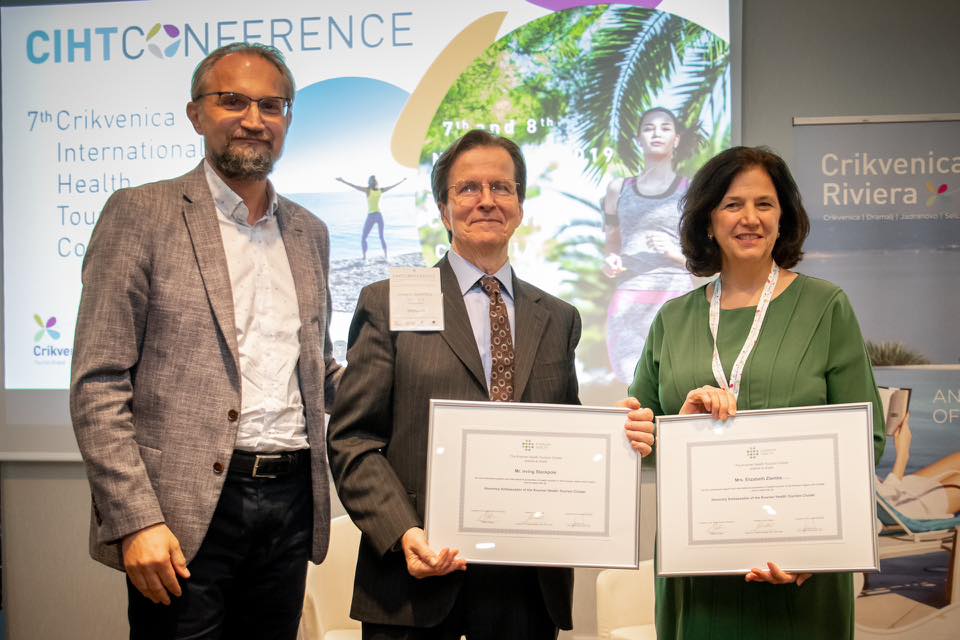
Doug Lansky's two workshops on Destination Development and Creative Problem Solving ended the work part of the opening day, which was then followed by a very pleasant Healthy Party, with fine local wine and blue fish specialities. And music and dancing that went on late into the night and past the bedtime of this correspondent.
All were fully awake for the following morning's opening session, which included CIHT 2019 ambassador awards for the veteran and highly experienced husband and wife team, Elizabeth Ziemba (whose opening presentation was on Accreditation: What It Can and Cannot Do for Clinics and Hospitals) and Irving Stackpole. Now 47 years in the medical tourism business, I was impressed with how Stackpole has kept abreast of the frightening pace of change in technology, and his presentation of technology and change was thought-provoking - The Future of Health Tourism Is In Your Hand; How personalization and digitization changes the patient experience?
Health talk aside, I learned a new term caused by the digital age. Kids today are digital natives, while we older folk have been forced to enter a brave new world and have been forced to become digital immigrants. I liked that description. The morning session was completed by Djurdjica Simicic of IQM talking about Integrated Quality Destination Management, followed by TCN offering a foreign resident media view of the Croatian medical tourism potentials and realities.
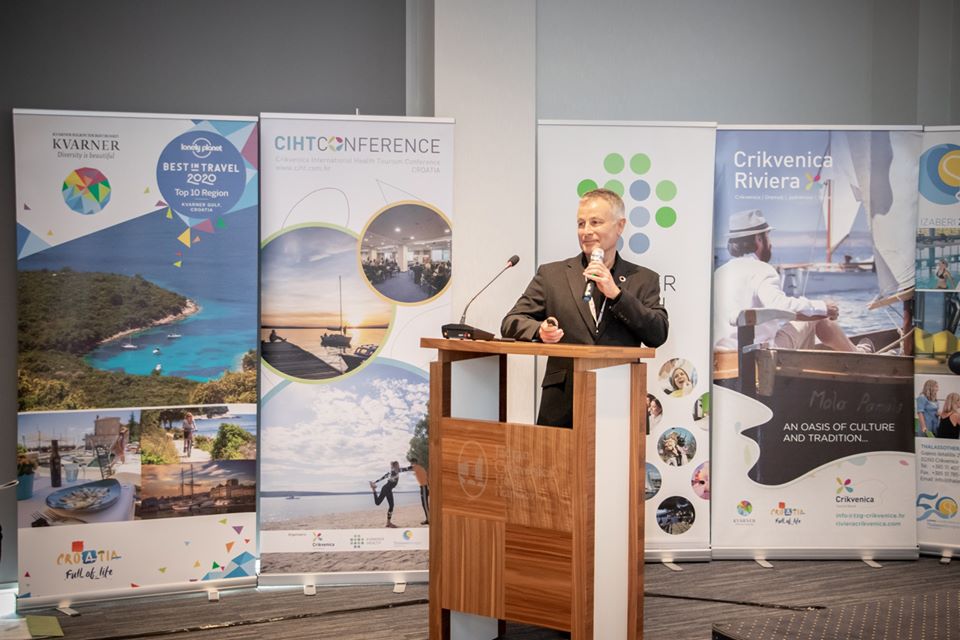
The quality of leading international speaker continued. Marc Ortmans, a brand strategist from the UK opened the late morning special, his subject matter Building Brand Futures. A particularly interesting aspect to his very illuminating talk was the story behind the campaign to launch the Champions League logo and brand back in 1992. So successful was the campaign that the very same theme music is used today, some 27 years later, and the brand is now worth 4 billion dollars.
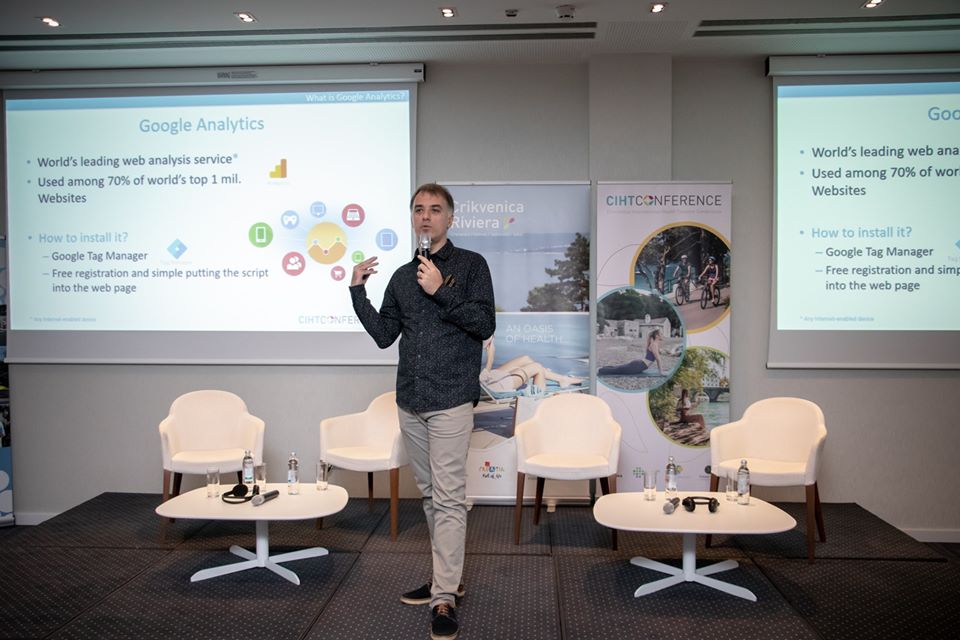
There was practical website advice from Croatia's leading Google Analytics expert, Robert Petkovic, in his presentation - I know your website generates visits to your clinic, but do you?
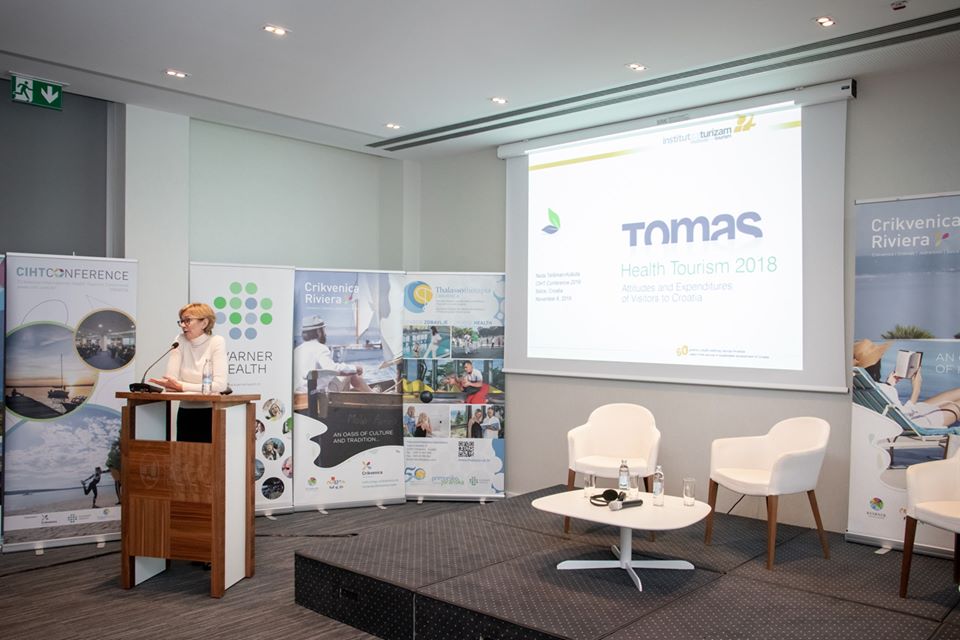
One of the points I made in my presentation at CIHT 2019 was that the word 'potential' was not only overused by everyone, but it was also a nice shield to hide the fact that not much progress was being made, or things worked on. Potential always points to somewhere in the future, and six years after medical tourism appeared in the 7-year strategic plan of the Ministry of Tourism in 2013, there is still no national medical tourism brand. Clusters operate individually, with Kvarner Health bigger than the brand of Croatia itself, and Zagreb investing $50,000 dollars in a questionable report - both in terms of content and whether the report might have been more useful to have been country-specific rather than just the capital city in isolation.
And so it was encouraging to listen to TOMAS – Health Tourism 2018: Attitudes and Expenditures of Visitors to Croatia, by Neda Telisman Kosuta, Senior associate at the Institute for Tourism in Zagreb. Although I have yet to see a full copy of the report, the presented results provided much food for thought and a basis for moving forward. One more part of this new gelling process.
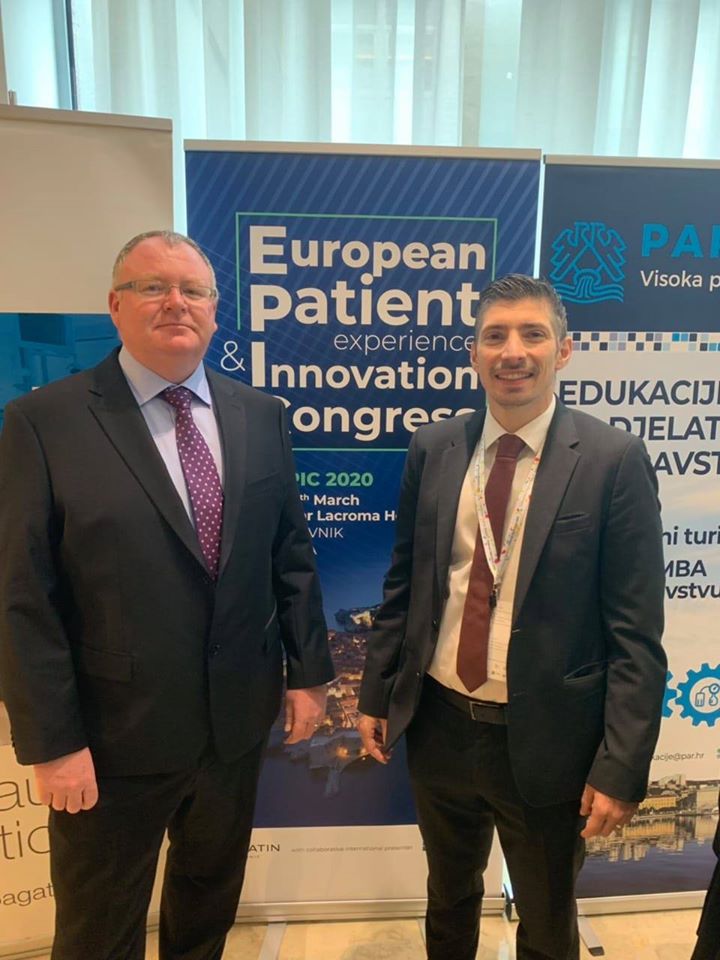
There were more presentations which I did not attend due to other commitments, but a chance also to catch up with Luka Medical Tourism Modric before the long drive home. it is more than two years now since Ognjen Bagatin introduced me to the world of Croatian medical tourism excellence, his infectious enthusiasm quickly spilling over onto me. His energy is endless, his determination relentless. And the signs are there that his efforts - and the efforts of many others - are beginning to pay off.
There is a long way to go, but don't rule Croatia out from reaching any future medical tourism World Cup Final.
Learn more about the CIHT 2019 conference on the official website, or check out the video report on local news below.
To follow the latest in the Croatian medical tourism industry, follow the dedicated TCN section.
Dr Prem Jagyasi: Bagatin Clinic is Case Study for Global Healthcare Excellence
October 25, 2019 - During a recent TCN interview with global medical tourism expert, Dr Prem Jagyasi, Croatia's leading Bagatin Clinic was mentioned several times. After the interview, I asked Dr Prem to tell us a little more about Bagatin and its standing on the global stage.
It is just over two years since I became aware of Croatia's medical tourism industry. My introduction was a chap called Ognjen Bagatin, who messaged me on Facebook one evening. I had no idea who he was, but he was very polite and complimentary about my work, which has said he had been following for a number of years.
A few days later we met at his clinic in Zagreb, a very modern and well-equipped affair, with superbly trained staff. Was I really in Croatia? He encouraged me to visit some other medical tourism facilities of excellence, which is how I came to do tours of Svjetlost Eye Clinic and St Catherine Specialty Hospital, a member of the Leading Hospitals of the World.
I was stunned. Here was a tourism industry where the very best seemingly could compete with some of the best in Europe. I got writing and Health Tourism is Coming Home: Why Zagreb is the Next Big Medical Tourism Destination was born.
I started attending health tourism conferences, wrote a lot more and even won a medical tourism media award in Malaysia.
And wherever I went, Bagatin Clinic was already there - at conferences, award ceremonies (such as Best Dermatology Clinic in Europe, above, for example). With my limited knowledge of the global market, it was hard to know just how good Bagatin was outside Croatia, and how the clinic compared with its European competition, but it was clearly doing an excellent job.
At this week's 3rd Adriatic Health, Sport & Tourism Investment Forum, international keynote speaker Dr Prem Jagyasi was kind enough to find time for a TCN interview. During our chat, Dr Prem mentioned Bagatin several times when giving examples of excellence. I saw it as the perfect opportunity to satisfy my curiosity - how was Bagatin Clinic perceived within the industry outside Croatia?
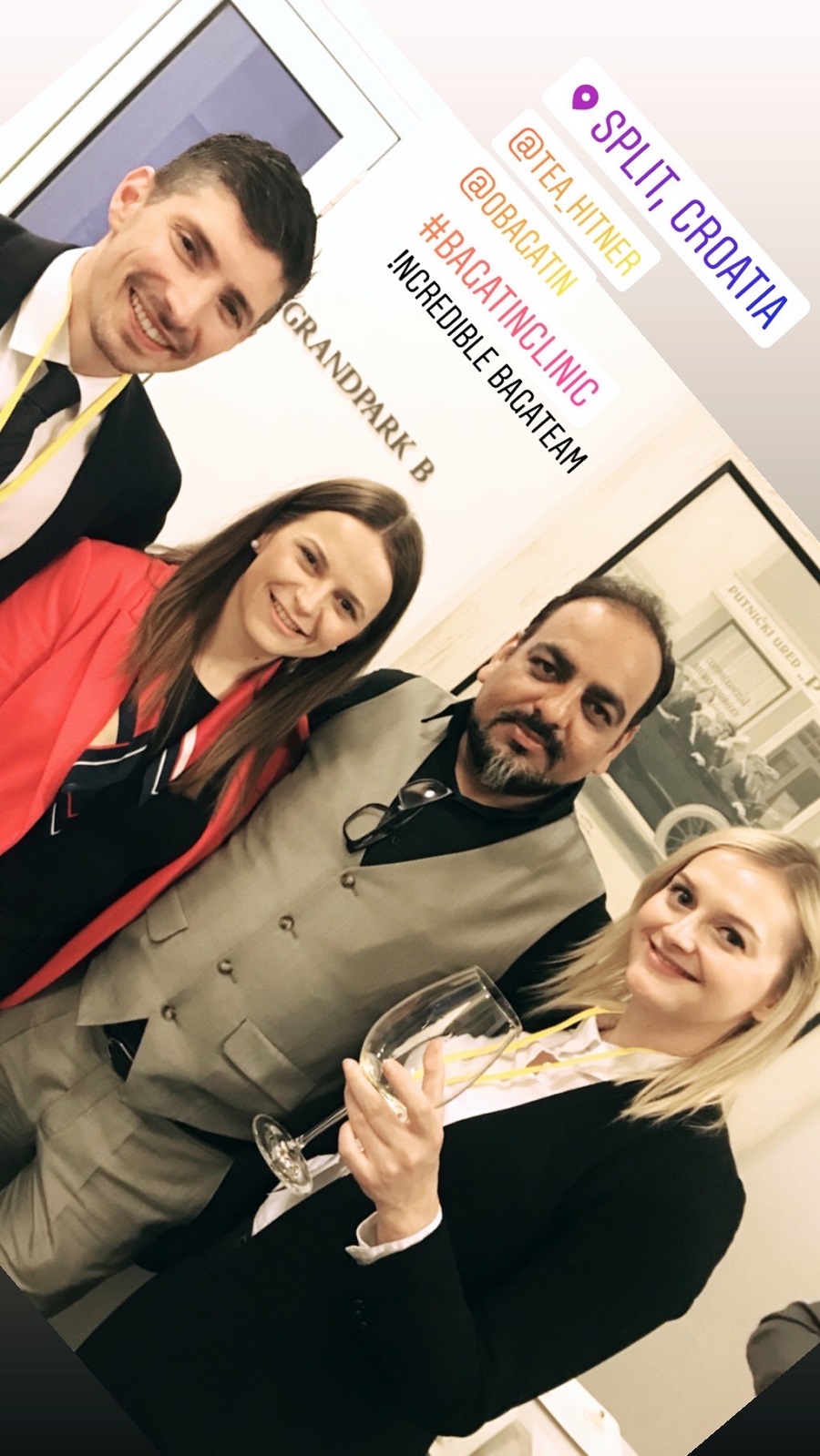
(Dr Prem with Team Bagatin - Ognjen Bagatin, Tea Hitner and Andrea Stipanic)
Bagatin is bringing the first patient experience conference to Europe in March, which will be held in Dubrovnik, with Cleveland Clinic. To me this is an amazing thing that one clinic can lead like this.
Not only that but Bagatin Clinic has put so much investment into capacity building, educating their team and also many others in the industry. This patient experience conference clearly shows that a private clinic or hospital can bring so much value to the brand of Croatia.
They have won many awards for their marketing and treatments, and I have personally visited their centre in Zagreb. The quality, the focus, the design – it is just incredible. I think they could be a perfect case study for other private hospitals and clinics on a global scale.

You have travelled the medical tourism world and seen many countries in action. Is there a similar example of a private clinic like Bagatin which is so far ahead and really dragging the rest of the brand along with it.
Not one clinic like Bagatin, no. There have been some hospitals who have arranged conferences, but nothing like Bagatin. And this patient experience conference will be great. It is the Bagatin relationship with Cleveland Clinic which will also see Cleveland involved.
One thing you will always notice about Bagatin is that they never just talk about their own clinic, but they are always talking about Croatia in general, talking about the wellbeing of patients. And they do capacity building brilliantly. I really do think that the government does need to acknowledge and support such clinics for the efforts they are making. There are perhaps some examples of larger hospitals doing similar things, but for a small clinic like Bagatin, it is unique.
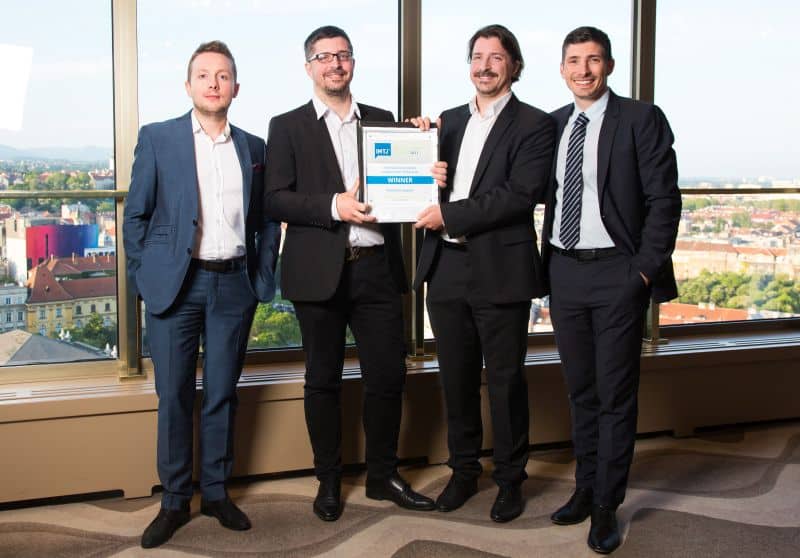
When did you first become aware of Bagatin Clinic, and tell us about the progress you have seen since that first meeting?
I met CEO Ognjen Bagatin several years ago. I have seen the clinic participating in international conferences in places like the USA for a long time now. I have listened to Ognjen speaking at many conferences all over the world. He talks about how his clinic evolved and became a leader, and how other clinics can also become leaders.
They are creating a beautiful case study which is a combination of three things: expertise in medicine, expertise in business, and utlising talent. I remember some members of Bagatin were in one of my workshops, and it was noticeable how engaged they were, and how eager to ask questions. They were very active, wanting to learn and improve. Bagatin has created a great working culture.
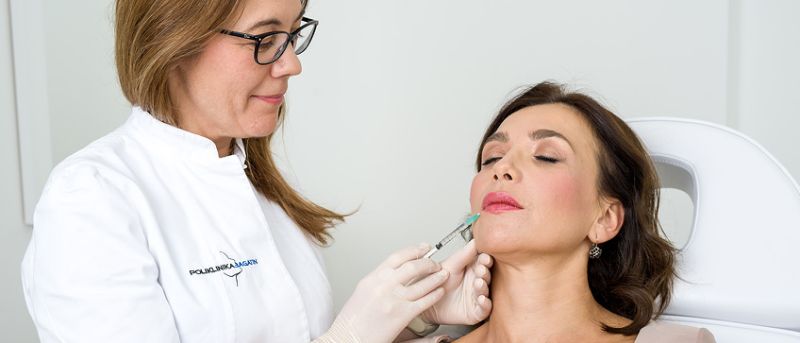
All this encouraged me to go and visit them in Zagreb. Ognjen was kind enough to show me every procedure room. The entire space was beautifully designed with open spaces and lots of natural light. Every single element was very well thought out.
I later researched the clinic and could see the quality of service they provide and the code of ethics. They have developed a brilliant strategy, and when I listen to him speak, he not only talks about the services he offers, but how Bagatin can contribute to help other clinics, both inside Croatia and elsewhere. I am always happy to see them at conferences.
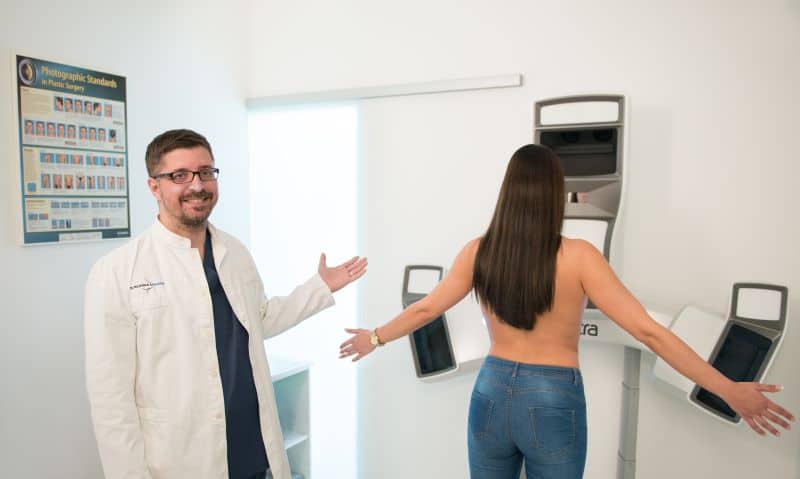
You obviously have a more global viewpoint than me. I can see that Bagatin is at the top of Croatian medical tourism healthcare, but where would you, with your knowledge and experience, put Bagatin Clinic on a European level?
Bagatin is, in my opinion, close to the very top in Europe. I have been recently to some excellent centres in Paris and Munich, and there are many excellent clinics. However, one issue which I see with clinics in more traditional European destinations is that they rarely have a great marketing strategy.
European medical tourism destinations build up their facilities, but they are not quite as good at getting their message out there. That is one area where I would put Bagatin at the very top – they really do have the best marketing I have come across in Europe. And of course, the quality of care and service that follows is excellent. This is where Bagatin excels where many European centres failing – reaching out. They do it brilliantly.
In terms of quality of services, they are on the level of some of the best European clinics, but in terms of packaging of the whole product – outstanding. Their support services are very impressive, including a great international patient support desk.
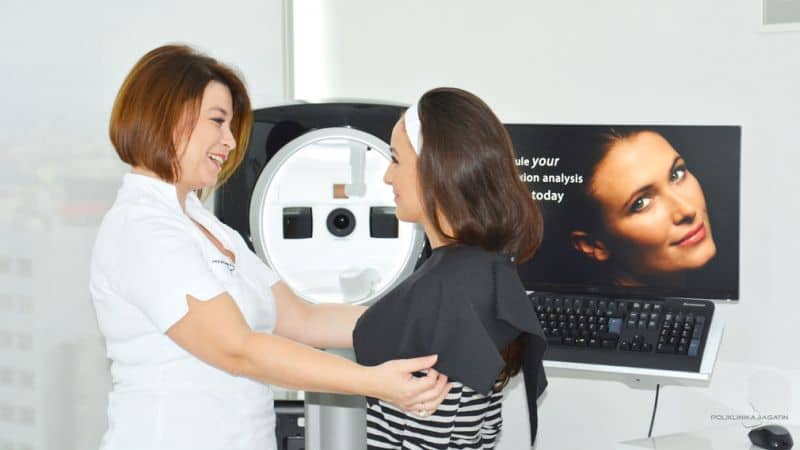
And they are setting up a great case study of excellence for other health tourism clinics to follow. The main components are quality, aesthetic design, transparency which they have, ethics and a code of conduct, international standards of customer service, an international patient desk and marketing office, and capacity building. And finally their branding and marketing, for which they have rightly won many awards.
Such clinics are essential to build the reputation of a destination, as governments alone cannot do everything. But I really do congratulate everyone at Bagatin Clinic – they are doing a wonderful service for Croatia.
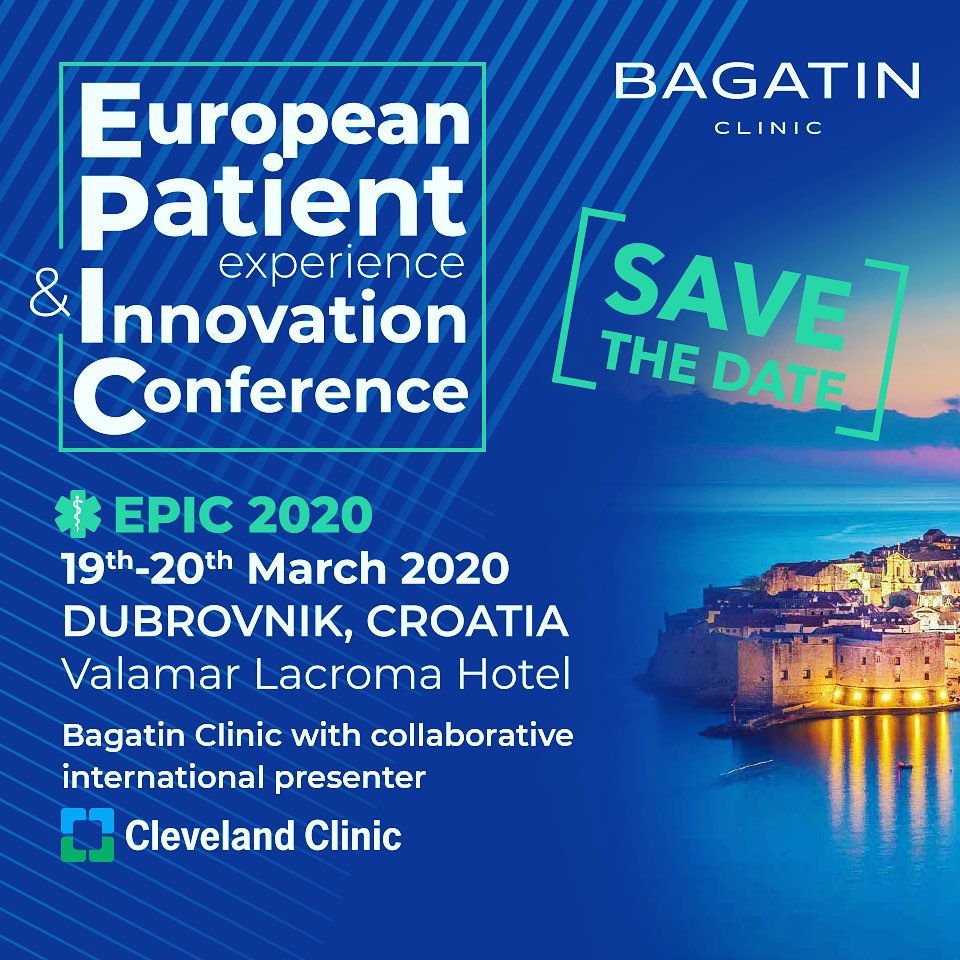
You can learn more of Dr Prem's visit to Bagatin Clinic from his blog.
To learn more about the services of Bagatin Clinic, visit the official website.
To follow the latest from the Croatian medical tourism story, follow the dedicated TCN section.
Dr Prem Jagyasi Interview on the Croatian Medical Tourism Industry
October 23, 2019 - The 3rd Adriatic Health, Sport and Tourism Investment Forum concluded yesterday. TCN caught up with one of the keynote speakers, Dr Prem Jagyasi, to learn more about his thoughts on the direction of Croatia's medical tourism industry.
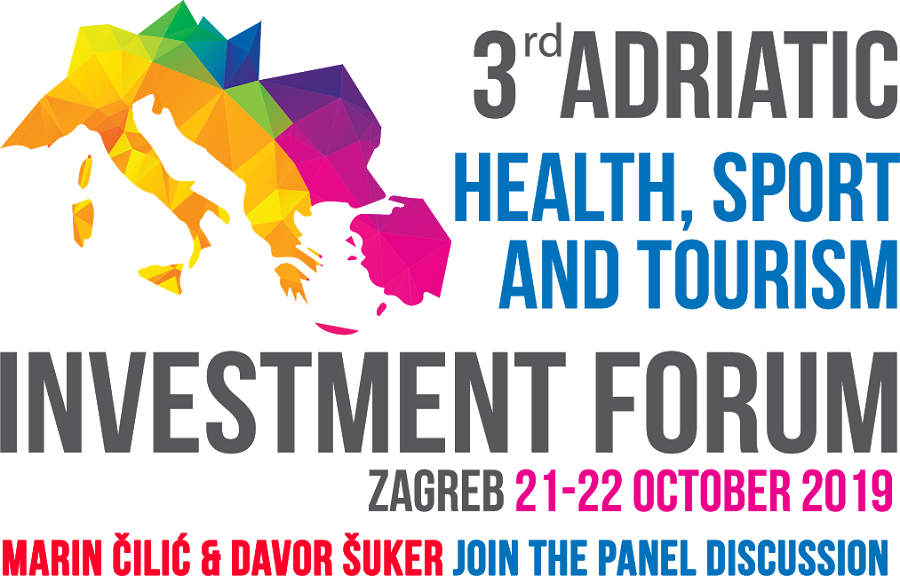
Tell us firstly about your relationship with Croatia as you seem to be more and more of a regular visitor here.
It is a good thing that Croatia wants to develop medical tourism in a structured way. I see that the ministries of health, tourism and economy are becoming engaged to develop a strategy for health tourism, and that is what brings me here – to help that process along.
We know that there are many challenges and obstacles to be overcome, but I really think Croatia has great potential. They can be a leader in Europe, and they can also attract the American retiree market. There are over 100 million pensioners in the United States. A proportion of them could come to Croatia and bring up to 2.5 billion dollars of business to Croatia.
It was interesting yesterday to see the Pasman project, for example, where they are planning to put in the facilities and content to offer to these senior citizens from abroad. There are challenges ahead, but things are moving in the right direction. So my interest is in working with both the potential and the challenges here in Croatia.
I would like to add that this has been a really excellent conference - some great speakers and panelists from all over the world. It has been a pleasure to participate once again.
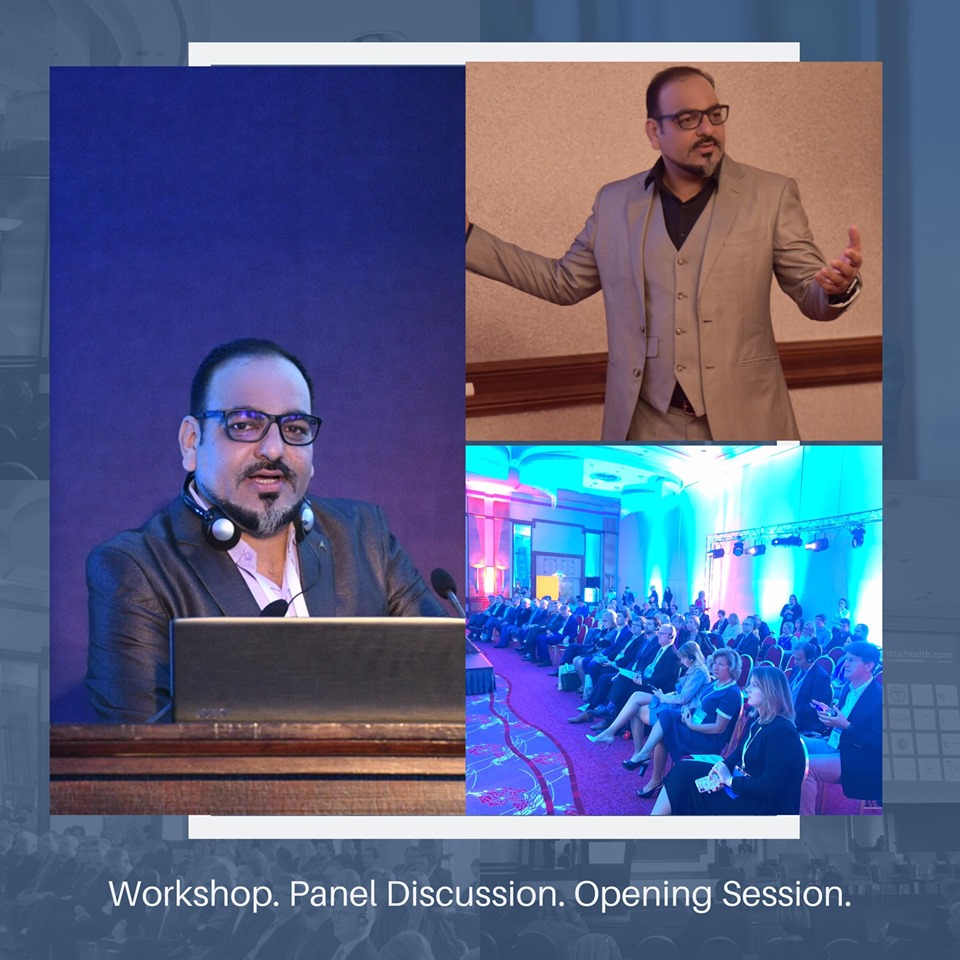
There was a phrase used in the conference that the region could become the 'Adriatic Florida.' Do you think that this is a realistic aspiration?
I don't see the need to repeat Florida, first of all, or call it that. I loved the phrase by Vlasta Brozicevic of Terme Selce, who suggested 'the Pearl of Europe.' A pearl for sports, wellness and healthcare, I really liked that term.
Croatia really has everything – resources, infrastructure, technology. All the components are in place, but it is still not easy for them to bring all the stakeholders together.
You travel all over the medical tourism world. Where should Croatia be looking to learn from to improve its medical tourism industry?
Every country gives us something different and beautiful to learn. So we have Malaysia, Thailand, Jordan, Turkey, some parts of India, how they have developed their industries.
Malaysia has developed the best structure of how public and private hospitals should work together to develop the brand, activities and strategy. Having said that, Malaysia gets most of its patients from one country – neighbouring Indonesia – so it is not truly a global destination yet, but things are changing.
Then we look at Turkey. Turkey has invested heavily and has major stakeholders such as Turkish Airlines. They have also had huge private investment. Turkey, by the way, has more patient to bed ratio than anywhere in the world. They have done a great job on promotion but you do not see the internal conflicts as there is no body which deals with everything, as you have in Malaysia. So Malaysia is a great example of one central body, but Turkey has some great promotional activities, as well as much bigger investment.
Then you look at Jordan, and see how well the private hospital association is working. They are very strong, and they are defining the prices. Jordan is also very well-known for bringing all its talent back to the country. Most of the medical professionals who study abroad return home to practice.
So I think we have separate things to learn from different countries. From Thailand we can learn about managing the political and diplomatic relationships, for example. They have a lot of business through the diplomatic embassies. And then look at Mexico, which has built an entire industry servicing the American market. It is a great example of building an industry based on the target market. So I don't think there is one destination which gives all the answers but there are many bits to cherry-pick from different destinations.
How strong is the brand of Croatia as a medical tourism destination within the industry? I was in Kuala Lumpur recently and the brand of the Malaysia Healthcare Travel Council is just so focused. It is fantastic. And then here you have the excellent Kvarner Health Cluster, Losinj, Island of Vitality, Zagreb, even Bagatin Clinic on its own at various international fairs, but rarely under the umbrella of Croatia.
Yes, this is a very big issue which Croatia needs to address. If you look at Malaysia, they have built a one-brand name. Having a different cluster under one brand name might be a beautiful idea, but having a different brand and promoting the two separately will not work or be good for Croatia. There is respect for Croatian medical excellence within the industry, but there is almost no brand recognition of Croatia as of now. So while the respect is there, the popularity, usability and reachability are not.
Because of the lack of visibility, Croatia is missing out on some of its potential target markets. I see very little activity here from the Gulf, for example, which is a US$ 5 billion industry, much of which is spent in Europe.
This idea of regional clusters could work, but only under a national Croatian umbrella.
So how visible is Croatia at the main international medical tourism fairs?
There is very little visibility from the Croatian government side. There are private clinics, in particular Bagatin Clinic, which is very visible in many conferences and fairs. The Croatian government should do more PPP projects, as was done in places like Turkey. There they took 10-15 clinics and hospitals and took them to participate in fairs. This is something I have not seen much of from Croatia. There are some segmented examples, but nothing coordinated.
Speaking of Bagatin Clinic, CEO Ognjen Bagatin recently announced that his clinic was hosting the first ever patient experience conference in Europe, in Dubrovnik in March, including presentation from Cleveland Clinic. One private clinic doing so much for the national industry. What are your thoughts?
Not only that but Bagatin Clinic has put so much investment into capacity building, improving their own team and others around them, as well as bringing the patient experience conference to Dubrovnik with Cleveland Clinic involved. It clearly shows that a private clinic can bring so much value to the brand of Croatia. They have won so many awards, not only in the marketing. I have personally visited their clinic and it is excellent on all levels. The quality, the focus, the design – it is all incredible. That could be a beautiful case study for other private hospitals and clinics.
You can connect with Dr Prem Jagyasi via his website.
To learn more about the Adriatic Health, Sport and Tourism Investment Forum, click here.
To learn more about the forum organisers, including their other initiatives to develop medical tourism in the Adriatic, visit the Medical Group Ltd website.

To follow the latest from the Croatian medical tourism story, follow the dedicated TCN section.
Lessons from Poland: How to Develop Medical Tourism in Central Europe
October 23, 2019 - Lessons from Poland, the latest opportunity for Croatia's medical tourism chiefs to learn best practices from another country, but is anyone listening?
Sometimes the clearest lessons come from the most unlikely of places.

The 3rd Adriatic Health, Sport & Tourism Investment Forum concluded in Zagreb yesterday. It was a very stimulating event for me personally n terms of international contacts made, as well as being extremely well supported by some impressive international expert speakers, two Croatian government ministers, high-profile characters from the world of Croatian sport such as Davor Suker and Marin Cilic, and others. But the presentation which caught my eye and was the most important for those with an interest in developing medical tourism in Croatia came from a less celebrated source.
The medical tourism industry of Poland.
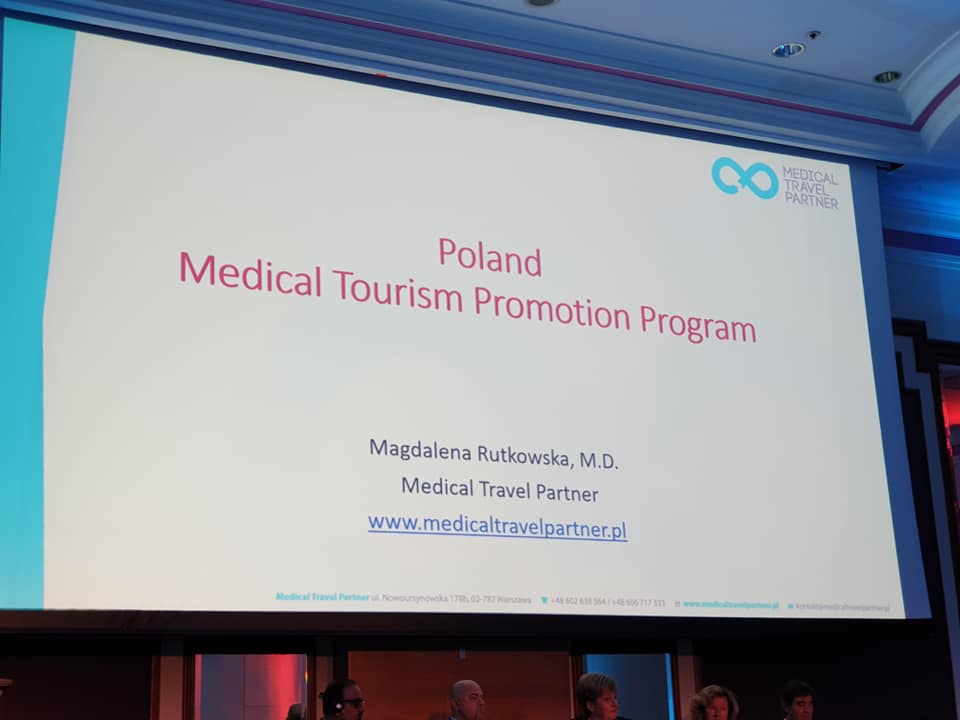
I am still learning about the global medical tourism industry and was not aware that Poland even had a significant medical tourism industry, let alone one which was allocated time to present at the conference, but from the moment I saw the first slide of Dr. Magdalena Rutkowska's presentation I was hooked.
Poland Medical Tourism Programme. That had a nice, unified and national feel for a medical tourism brand. A little like the Malaysia Healthcare Travel Council. And very unlike the way Croatia presents its medical tourism industry internationally.
International trade fairs may come across the Kvarner Health Cluster, Losinj, the Island of Vitality, Zagreb, Bagatin Clinic (the most active Croatian clinic nationally and internationally), but Croatia Medical Tourism Programme? A concept almost unheard of. Such a simple and obvious step and one that Croatia has yet to master.
But Poland had gone further than branding its industry on a national level, much further. Let's agree that Poland is not the number one medical tourism destination in the world, and its potential is less than Croatia's but in terms of what it is doing to realise its potential, it has a LOT of lessons for its Adriatic neighbour.
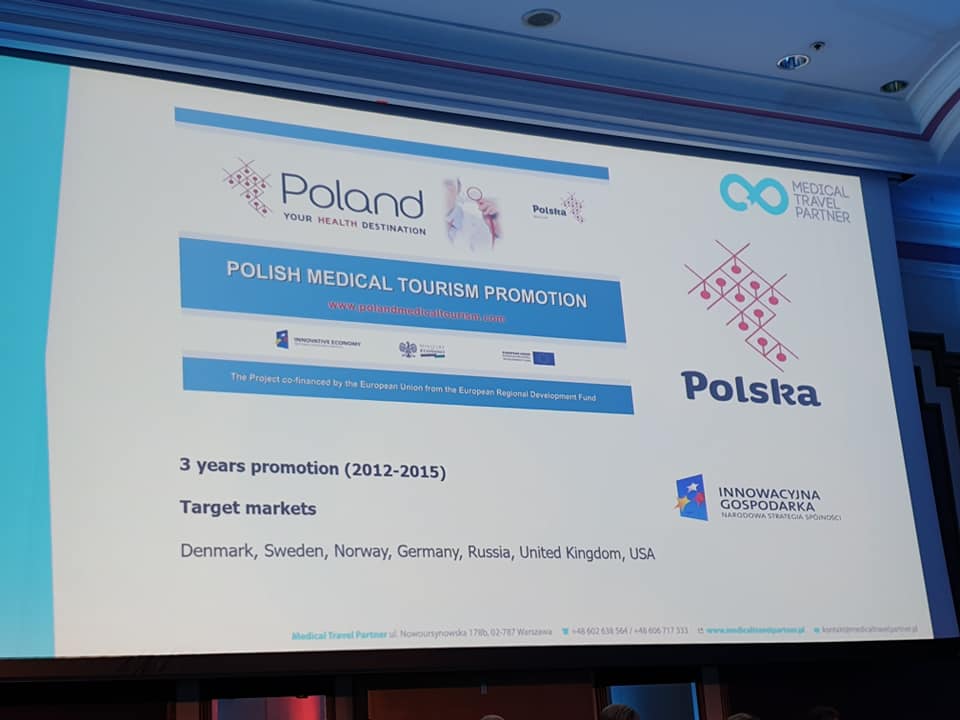
I almost feel stupid celebrating Poland's success, because all they have done is implement a common sense approach with determination, an approach which has not only brought tangible success, but at zero cost to the Polish taxpayer, and resulting in the approach being expanded and extended.
A concept which could - and SHOULD - so easily be taking place in Croatia, the country which has medical tourism at the heart of its 7-year tourism strategy of 2013, but which has yet to deliver anything concrete. Simply following Poland's example would be an excellent way to start, and I found Magdalena after her presentation to learn more.
The 3-year medical promotional project worth 5 million euro of EU money between 2012 and 2015 had its origins back in 2010 when some of Poland's private clinics started to lobby the government to do more to promote the medical tourism industry. After concerted pressure, the Polish government decided to include medical tourism in 15 sector tenders. Magdalena Rutkowska and her team stepped forward and Medical Travel Partner Poland became the implementing agency of the project. Initial target countries were Denmark,Germany, Norway, Sweden, UK, USA and Russia.
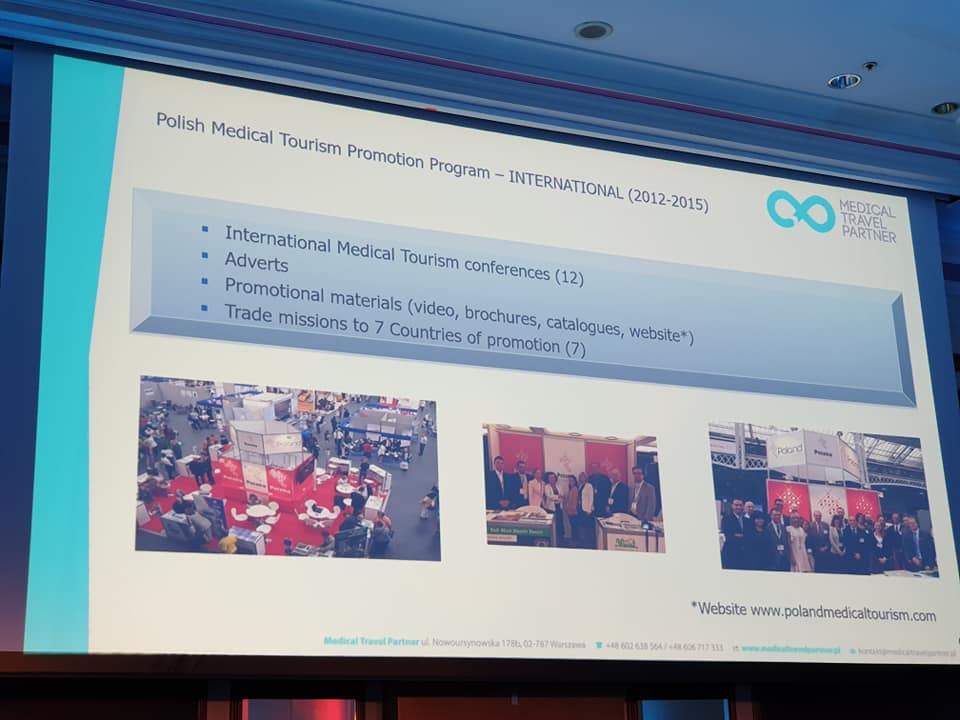
Brand Poland went on tour.
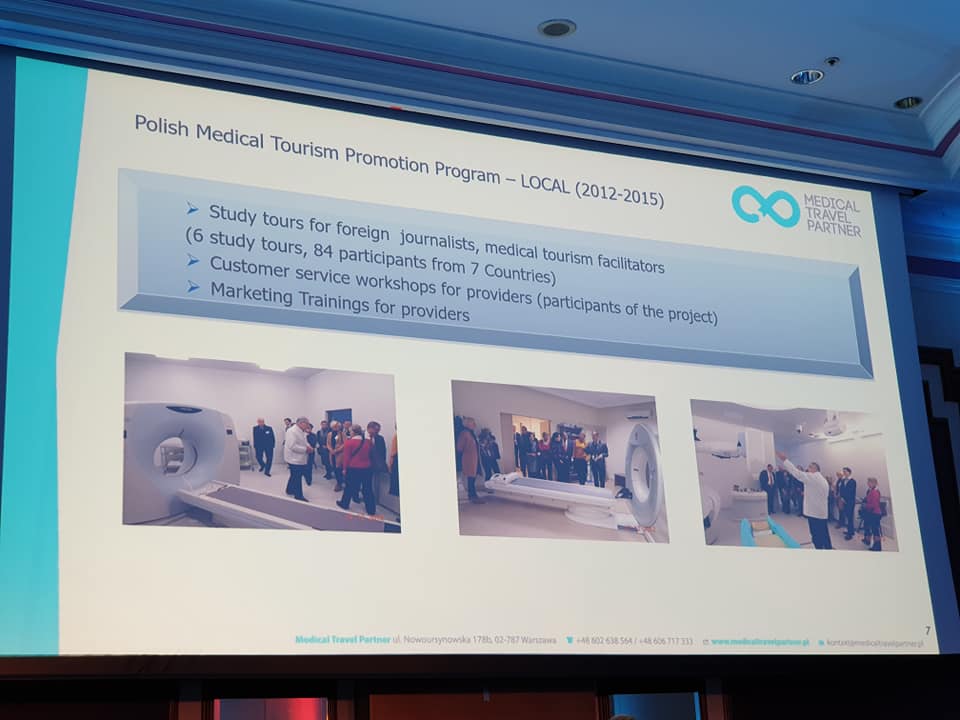
And Brand Poland played host, as well as capacity building and strengthening the brand with the participating stakeholders.
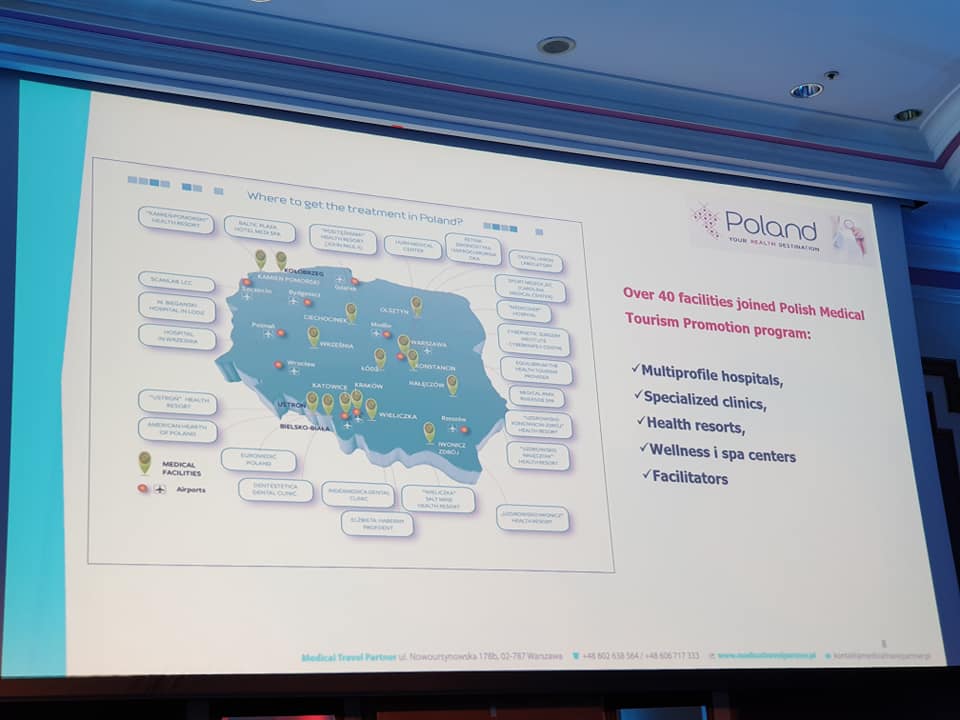
Some 40 clinics took part in the first phase of the project, investing their money in the joint promotion of Poland's brand as a medical tourism destination. Some 75% of their investment costs were reimbursed from the EU.
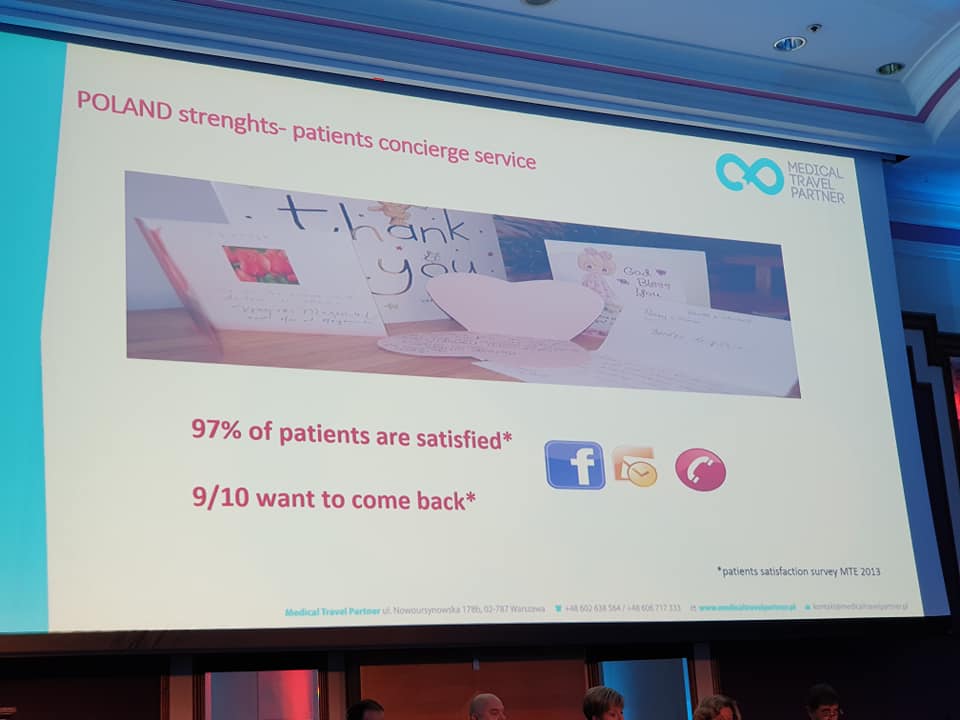
The project included feedback from the medical tourists who came to Poland during that period.
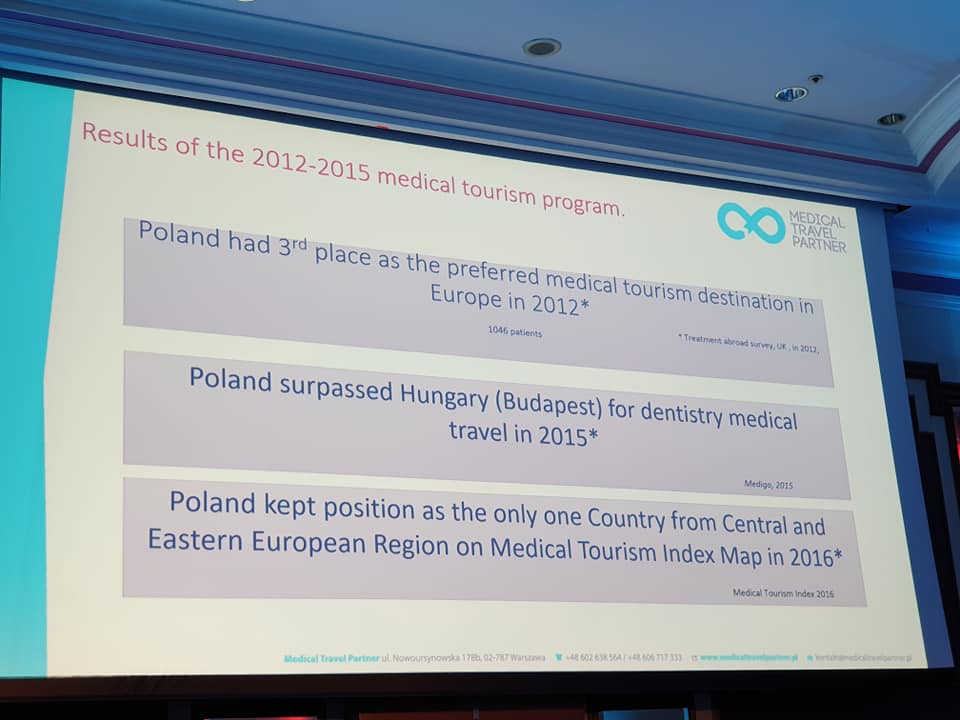
And there were some initial results for which Poland can be proud.
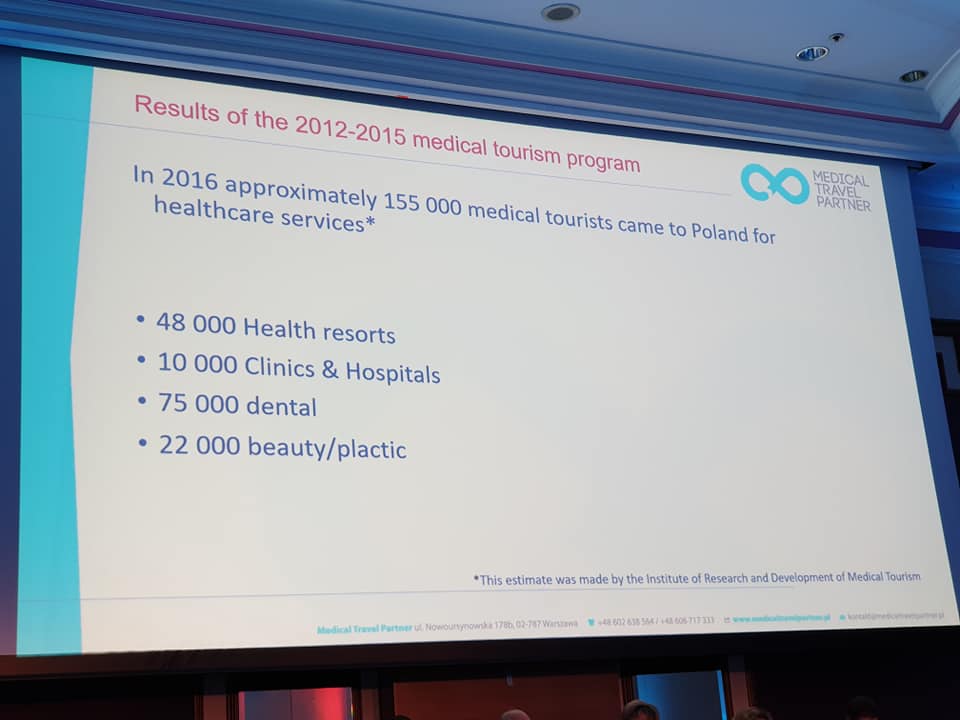
The numbers may be small for now, but the foundations being built are very solid. You can learn more about the results of the initial phase here.
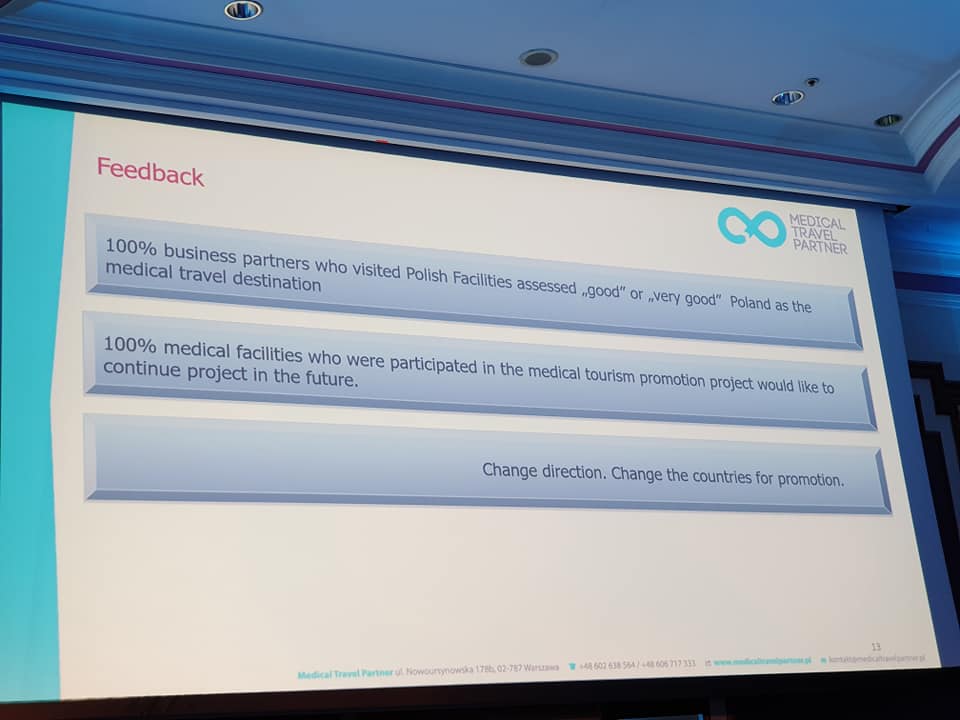
After the first 3-year phase, the project continued. Additional target countries were added, as the EU wanted Poland to look at attracting tourists from non-EU countries.
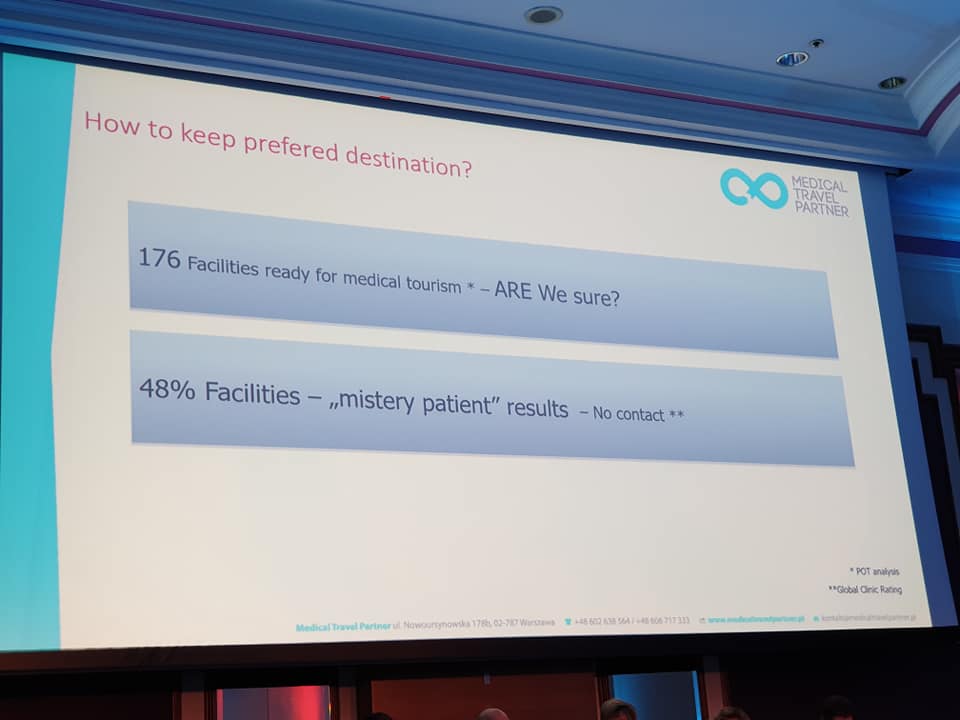
Interest from clinics was strong, with some 176 interested in participating, a significant increase from the initial 40.
While progress has been made, there is still plenty to do, of course. As part of its ongoing quality control, mystery shoppers tasted the response rate to enquiries from the participating clinics - there was no reply from 48 of them. So clearly some work to be done - train these clinics to be appropriately responsive or exclude them from the project.
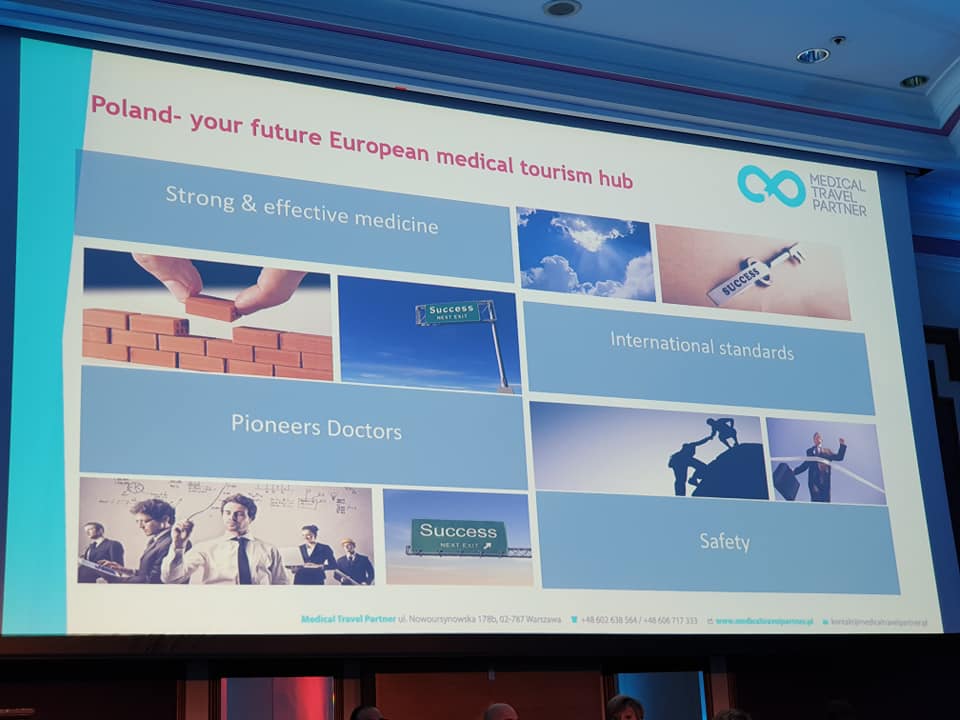
Small steps, but concrete ones, and an emerging national brand, with a clear vision of the future direction.
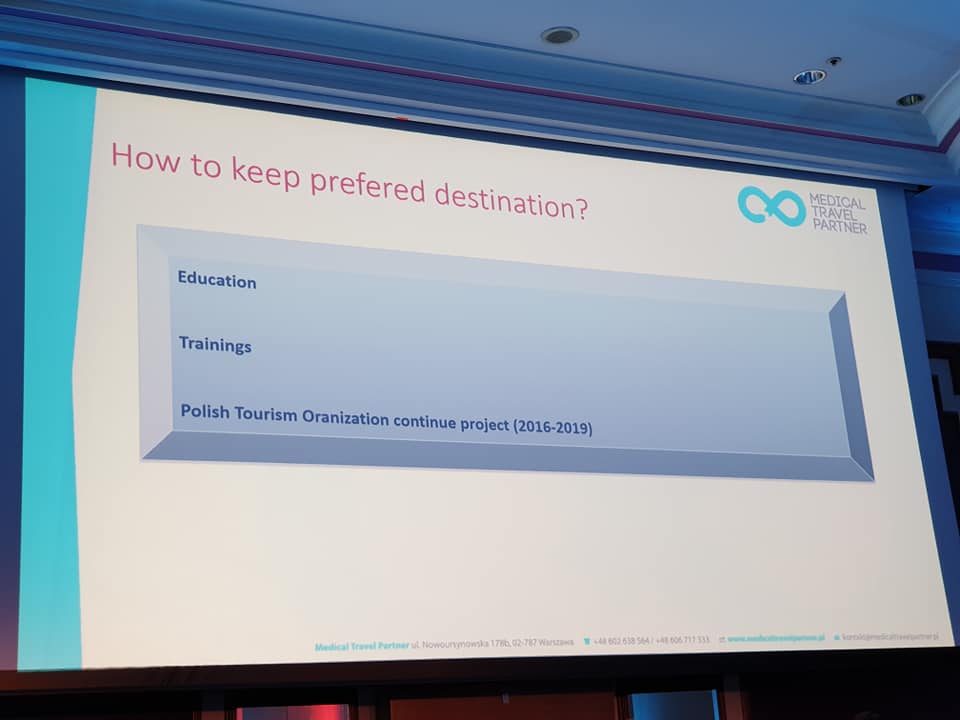
And after the initial success, more official interest and partnership, with the second phase under the umbrella of the Polish Tourism Organization.
The timeframe from project concept and submission to approval and commencing - just six months, although it should be noted that the money took longer to arrive and so many projects were initially financed by Poland and then reimbursed by the EU.
Could it happen in Croatia?
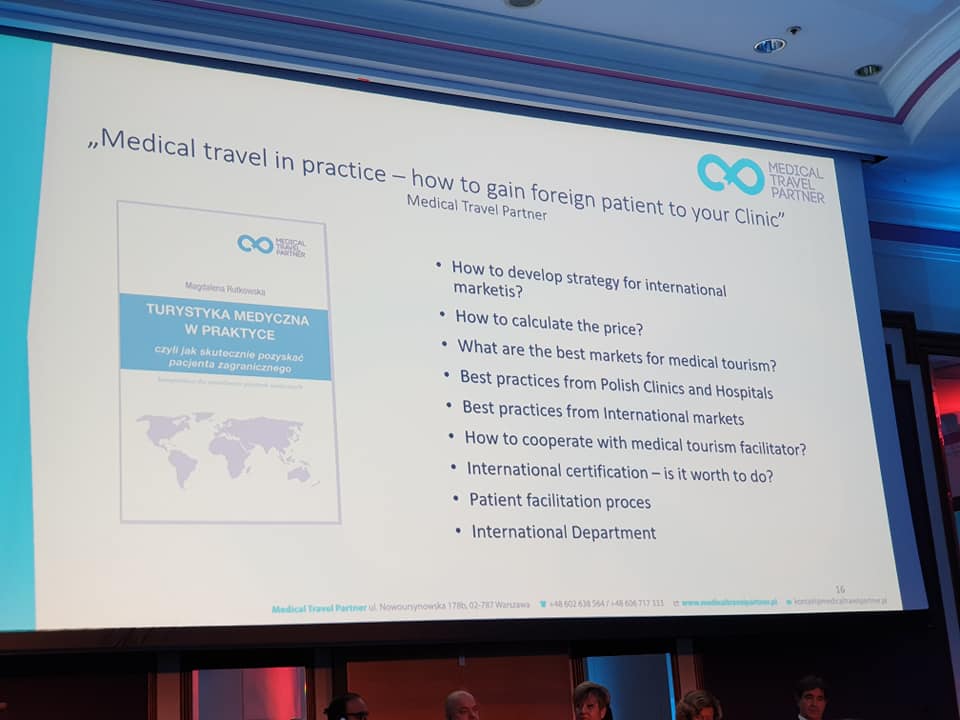
Poland's journey is a process of learning and trial and error. There were some expectations which failed to materialise, whereas other unexpected market opportunities arose. They had high expectations of the rich Polish diaspora in places such as the United States, but this has so far failed to provide a lucrative source of clients. On the other hand, simply by being present at international trade fairs and networking, new markets in former Soviet replublics such as Tajikistan and Uzbekistan have materialised.
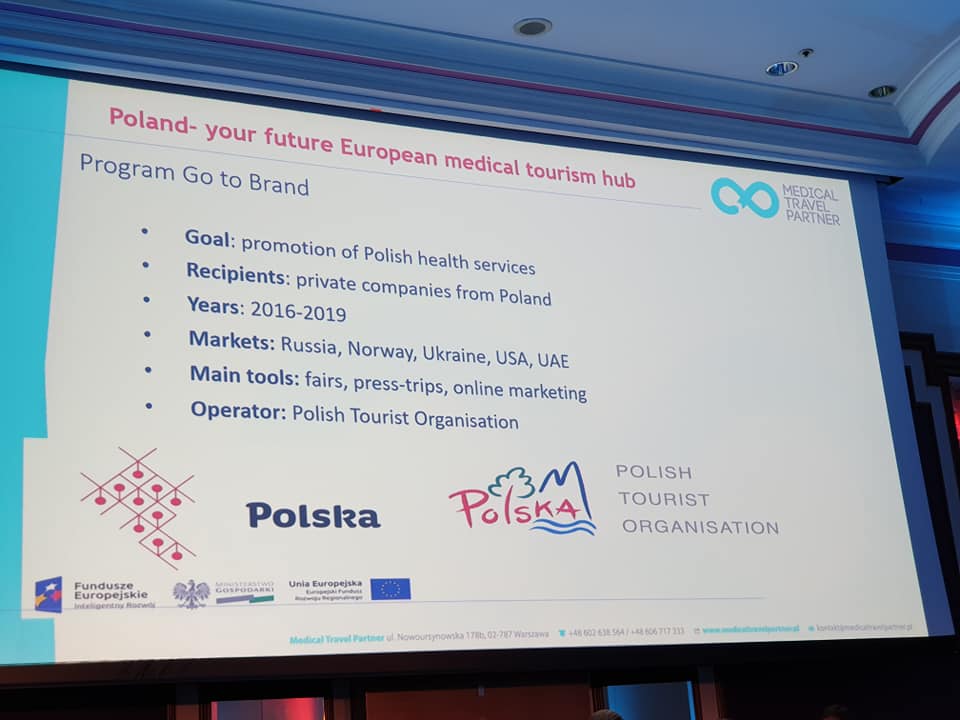
For many participants, I am sure that this Polish presentation will not rank as one of the top moments of what was an excellent conference, but for me it was the most useful lesson of all for those with a genuine interest in moving Croatian medical tourism forward to the level it should be at to realise its considerable potential.
And then, a rare moment later in the conference - questions to the panelists allowed from the floor, something that happens all too rarely. I decided to raise my hand, firstly to congratulate Magdalena on an excellent presentation, and then to address my question to fellow panelist, Robert Pende, Croatian Assistant Minister of Tourism.
"Assistant Minister, I have lived in your country for 17 years now and have heard one word more than any other when talking about developing Croatia's future - potential. Croatian tourism has so much potential, the medical tourism industry has so much potential etc. Medical tourism has been at the heart of your 2013 - 2020 medical tourism strategy for almost 7 years now. Putting the word 'potential' aside for a moment, and having listened to the excellent and very concrete example from Poland, can you give us any similar concrete examples of projects undertaken in that time, and what were the results?"
I will leave you to guess the response.

To learn more about the forum organisers, including their other initiatives to develop medical tourism in the Adriatic, visit the Medical Group Ltd website.
Learn more about Polish medical tourism in the video below, and to follow the latest from the Croatian medical tourism journey, follow the dedicated TCN section.
Investment Ops Presented at Adriatic Health, Sport & Tourism Forum in Zagreb
October 21, 2019 - The 3rd Adriatic Health, Sport & Tourism Investment Forum kicked off at Hotel Westin in Zagreb with a very high-profile audience on Day 1.
As renowned medical tourism speaker Dr. Prem Jagyasi put it as he moderated one of the panels on the first day of the Adriatic Health, Sport & Tourism Investment Forum in Zagreb:
"I have been to 65 countries and spoken at countless health tourism conferences, but this is the only one which combines health tourism with investment. That is what makes it unique."
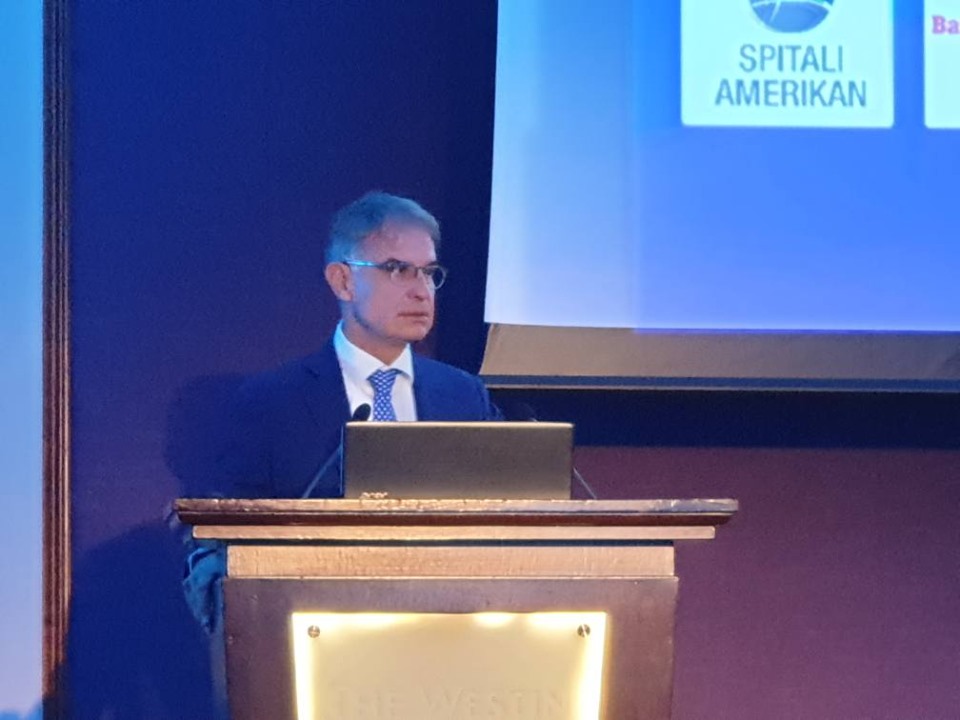
It seems that Dr.Prem, one of a number of highly respected international medical tourism speakers at the event, was not alone. The turnout of local dignitaries was no less impressive. Both Minister of Tourism Gari Cappelli and Minister of Health Milan Kujundzic gave introductory speeches, and there was representation from no less than 16 foreign embassies in Zagreb.
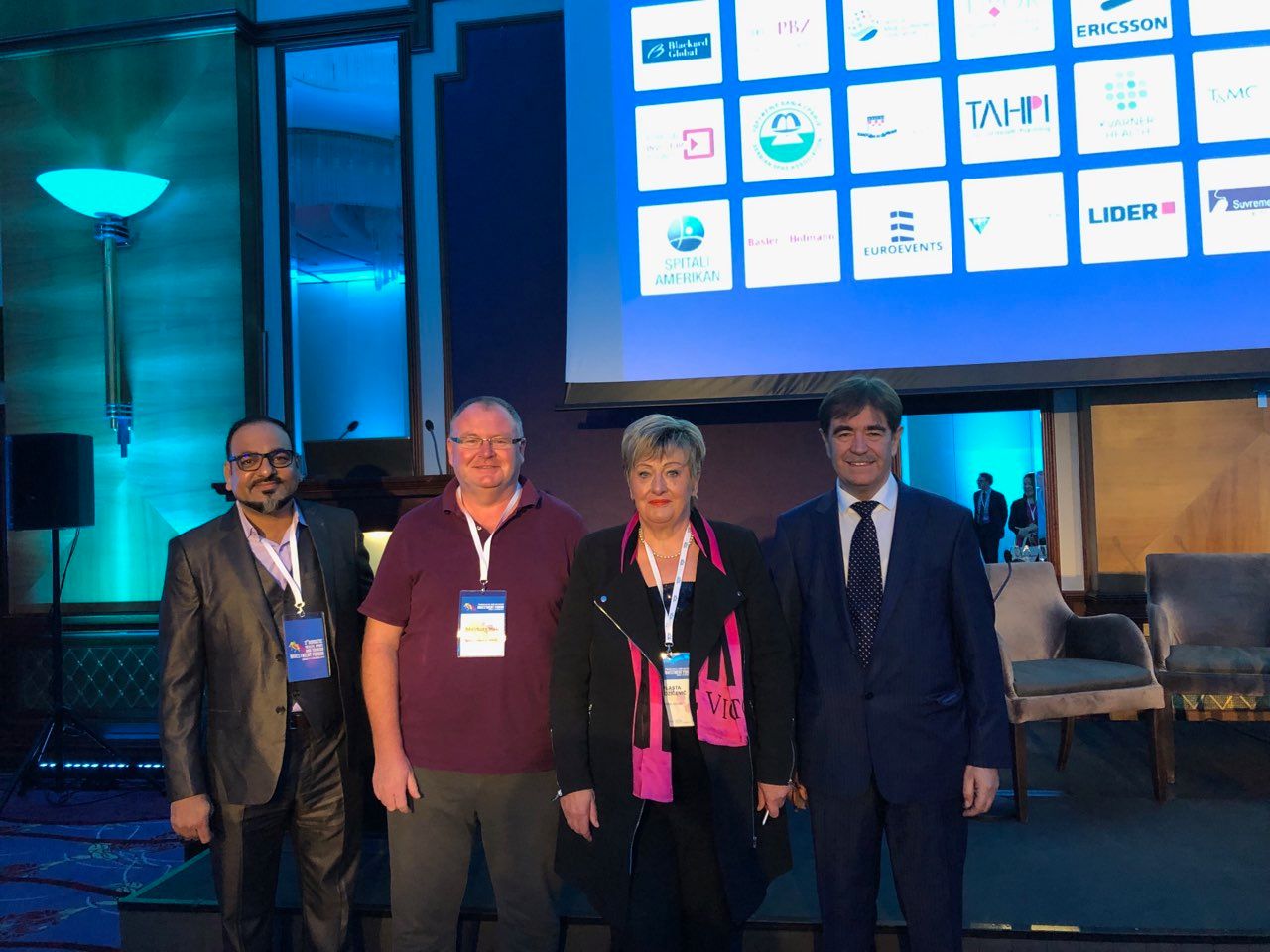
Some of the top names in Croatian medical tourism were also on the speaker list, including Vlasta Brozicevic, the industry pioneer behind Teme Selce, pictured here with Dr Prem, TCN and conference organiser, Dr Miljenko Bura.
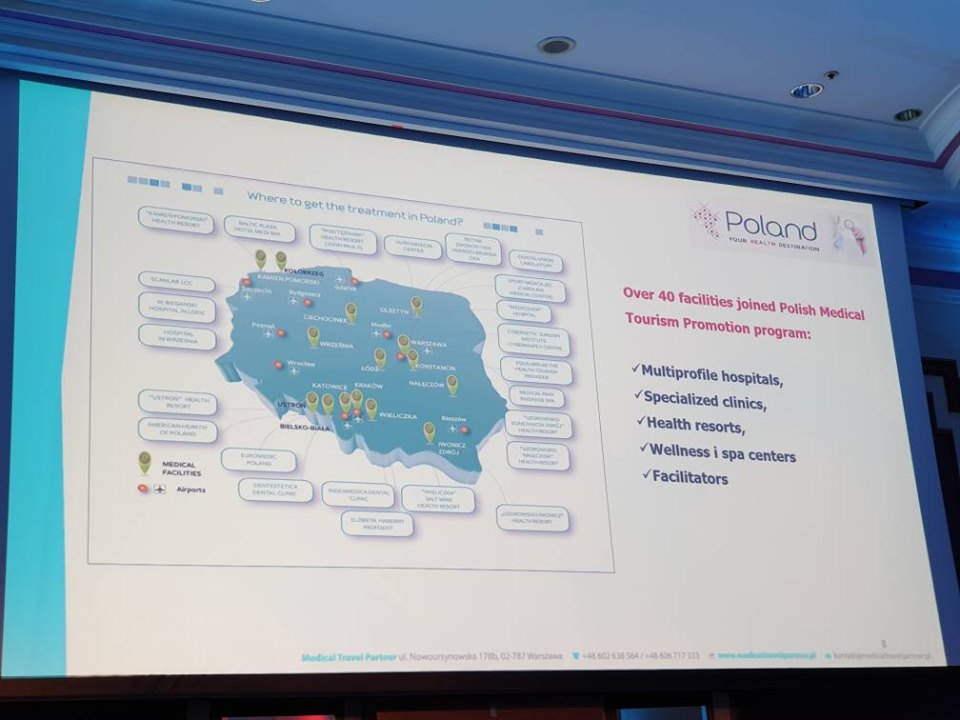
Two things which sets this conference apart from other medical tourism conferences in Croatia is that focus on investment, as well as examples of best practices and experiences from other countries in the region. Magdalena Rutkowska's presentation on the success of Medical Tourism Partner Poland's success in using EU funds in developing Poland's medical tourism story resonated strongly, as Croatia looks to take advantage of its own considerable medical tourism potential.
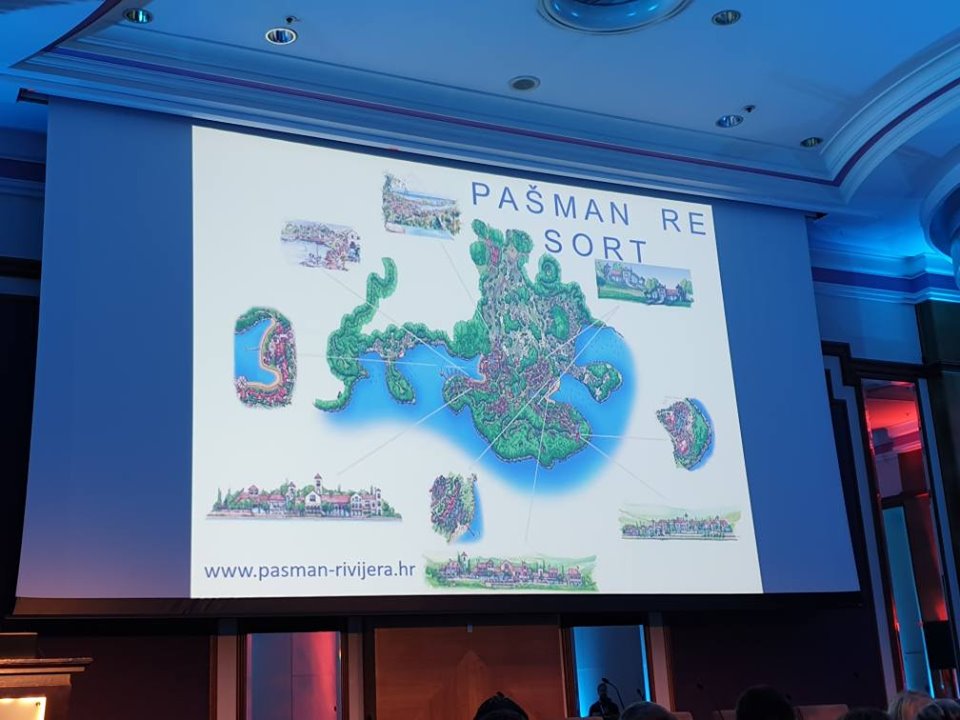
And there were presentations of concrete projects either in the planning stages or ready for investors. Among them, Jeff Blackard's 500-million-euro Pasman Rivijera project on the island of Pasman, which will transform wellness tourism in Croatia if it is realised.
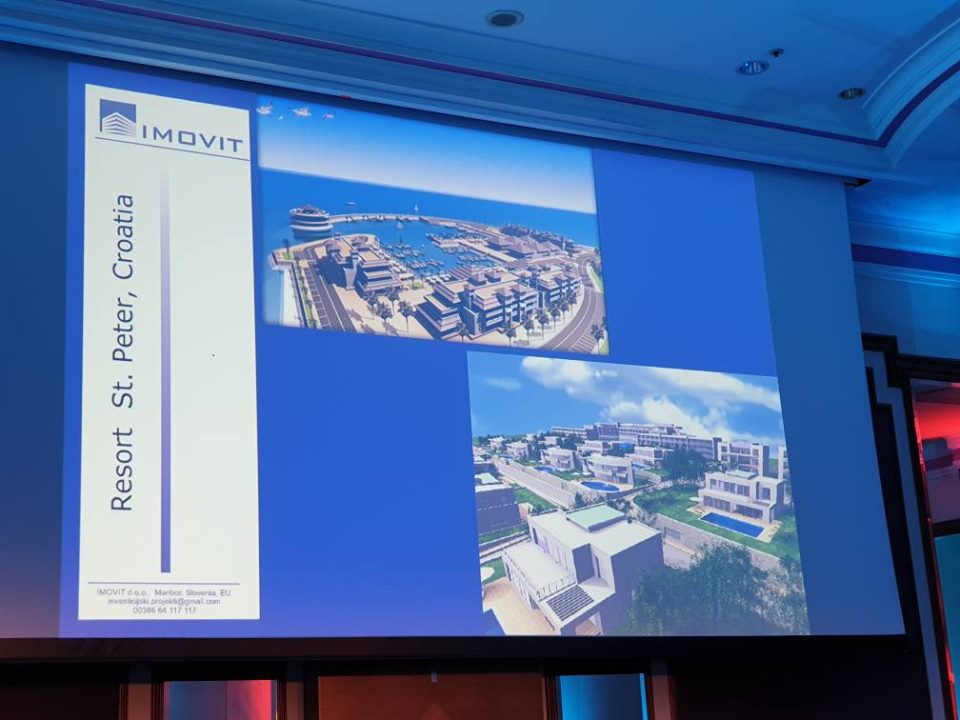
There were plenty of other concrete projects ready to go and looking for investors, such as this one on Pag.
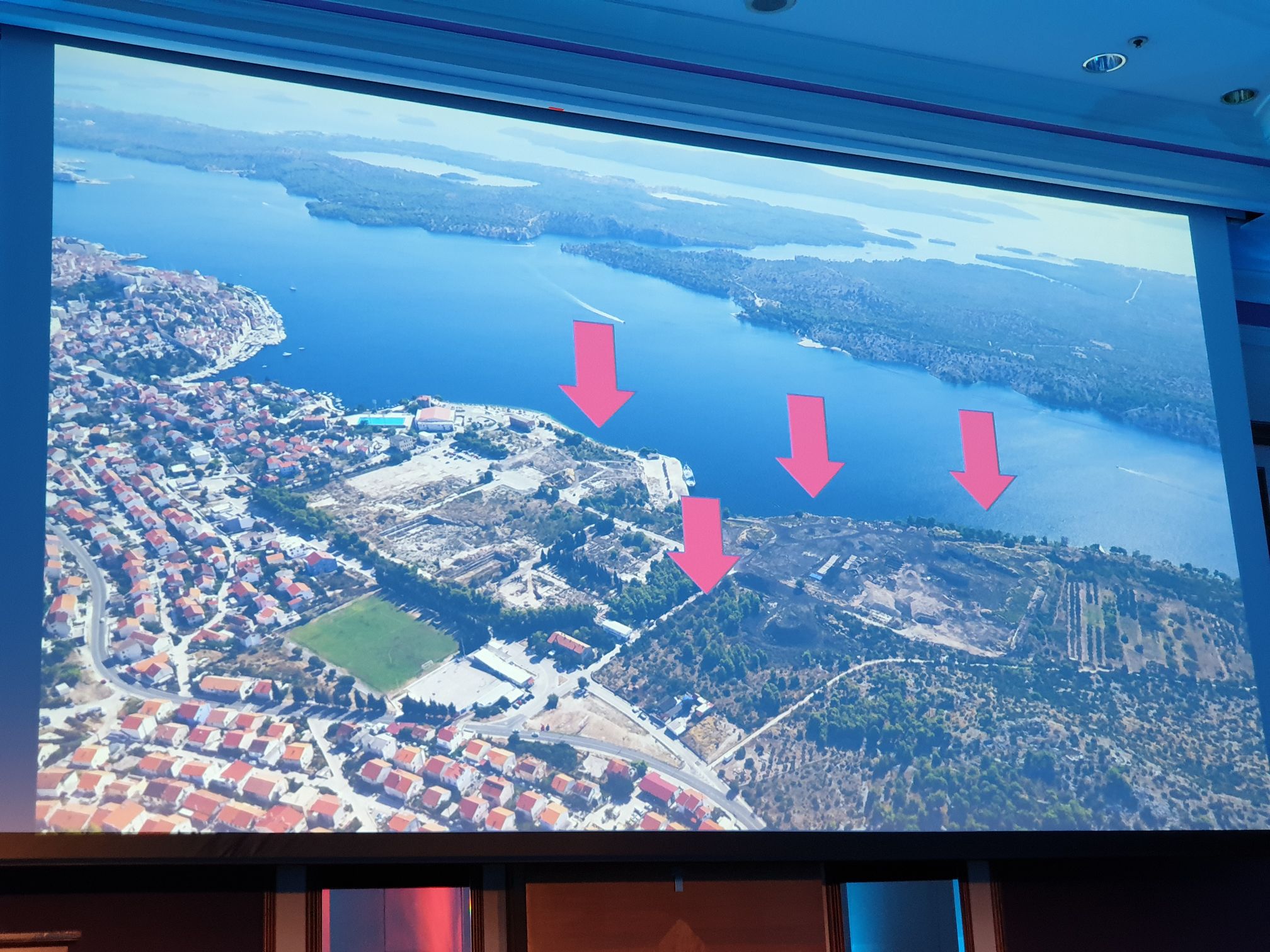
But the main investment focus was on the city of Sibenik, the main sponsor of the forum, and Sibenik Mayor Zeljko Buric, another high-profile speaker, who gave an intelligent and eloquent overview of the investment opportunities for his city.

The 3rd Adriatic Health, Sport & Tourism Investment Forum concludes tomorrow with another day of presentations, panels and workshops. Keeping in tune with the high-level interest so far, among the speakers will be Croatian sporting legends Davor Suker and Marin Cilic.
To learn more about the forum, click here.
To learn more about the organisers, including their other initiatives to develop medical tourism in the Adriatic, visit the Medical Group Ltd website.

To follow the latest from the Croatian medical tourism industry, follow the dedicated TCN section.
German Medical Wellness Association President Lutz Lungwitz on Croatian Health Tourism
October 14, 2019 - The 3rd Adriatic Health, Sport & Tourism Forum gets underway in Zagreb next week with a rich field of international speakers, including Lutz Lungwitz, President of the German Medical Wellness Association. TCN caught up with Lungwitz ahead of the conference.
The story of the excellence of Croatian medical tourism is slowly making its way into international channels. One key channel to connect the international medical tourism community to the opportunities within Croatia is the Adriatic Health, Sport & Tourism Forum, which will meet for the third year at the Westin in Zagreb on October 21-22, an event which TCN will be attending. As with previous years, this year's event has brought together some of the leading figures in the world of medical tourism, and TCN managed to catch up with one of the key speakers recently, Lutz Lungwitz.
Lutz Lungwitz has been President of the German Medical Wellness Association (www.dmwv.de) and of the International Medical Wellness Association, both based in Berlin, since 2004. He was kind enough to find time in his busy schedule to answer a few questions about the forum and Croatian health tourism in general.
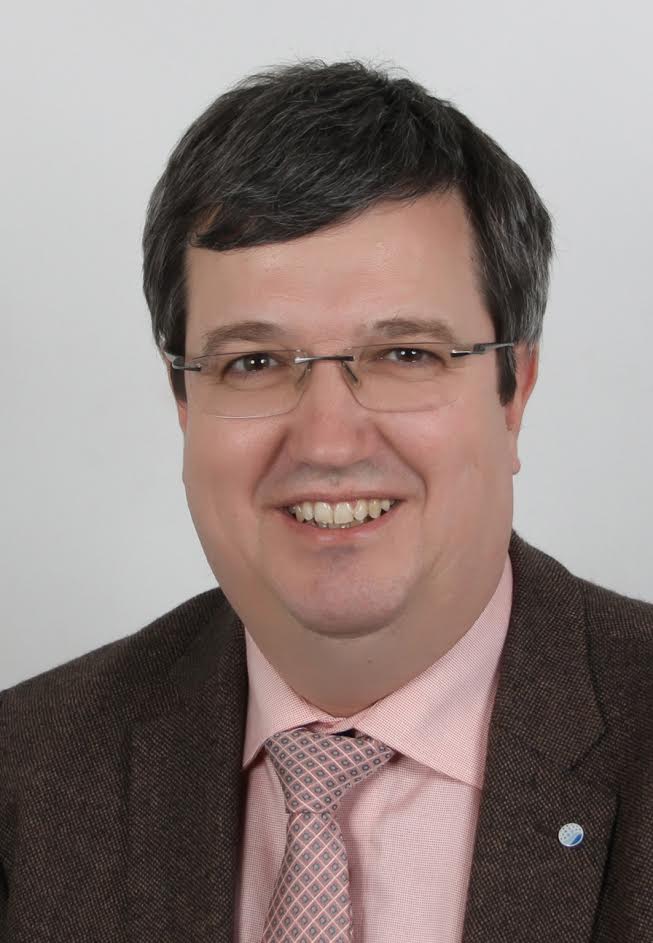
1. You are a regular speaker on the Croatian medical tourism circuit. Tell us about the Adriatic Health, Sport and Investment Forum - what makes it a little different than the rest?
The first two Adriatic Health and Tourism Investment Forum in 2017 and 2018 showed us very clearly, how important it is to initiate new tourism projects in the field of health and medical wellness and to discuss as one of the main points investment opportunities at the same time. This is the main and important difference to some other, although very nice, conferences in Croatia for the development of health tourism. We have to discuss about financing strategies; without a budget all of us will lose and the dream of development in health tourism is just a dream.
In addition, the high professionality of Dr. Bura and his team, his warm-heartedness and his great hospitality plays a very important role to come to Zagreb for the forum. Dr.Miljenko Bura helps considerably with this conference, and he has created a feeling that we are a great "family" for the development of various health tourism projects. It is fascinating how good Dr. Bura's network is for all of us. I get a lot of input from him and believe me, the conference is on a very high level, including speakers, translators and program.
2. A lot is written about wellness tourism in this region. Slovenia seems to have developed this sector well, with 40% of all overnights related to wellness, while it barely figures as a sector in Croatia, despite a proud history and large potential. Why do you think that is, and what are the main areas we should be focusing on?
In the field of health and wellness tourism, I don’t like to speak about the word competitors, I like more partners. The market is big enough and we will continue to rise in the future due to the age pyramid in Europe. The target groups and the respective country structure are different. I think Croatia should develop a modern young health tourism, that will especially contribute to the extension of the season on the coast, making the hinterland more famous and meaningful as a destination, as well as the capital Zagreb. Croatia can benefit from the numerous inputs from Slovenia. In Central Europe, the target markets are Vienna, Munich, Zagreb, Bratislava, but although Berlin if you look to the time schedules of the possible flights. If you look although to the flight schedules at Zagreb airport, you will find a lot of international flights, more than nice for the development of health tourism. However, the potential can only be achieved, if the service and the quality of the offers are correct. The importance of Croatian seaside resorts, for many decades, should be pointed out in a modern way. This history confirms wellness and health holidays in Croatia and is not artificial.

3. You are actively watching the Croatian medical tourism industry, and many experts say it has the potential to be in the top 10 in the world. Do you agree with that assessment? What is the potential of the industry in Croatia and what should the key focus of the stakeholders be to develop that industry?
Personally, the potential for the further development of medical and health tourism to Croatia seems very, very high. Croatia has a unique nature, both with the Adriatic, as well as the hinterland. Croatia is easy to reach and Croatian hospitality is world-famous. It is always hard for me to speak of a ranking, because it is not clear which scale is used. What is certain, however, is that Croatia has the potential to become a major and leading country for the promotion of health and therefore health tourism. For health tourism I feel, that Croatia can be a big player in the field of dental and rehabilitation tourism. For surgeries, the main important point is in my view, to get international accreditations, to show the customer the high level of medical solutions in your country. In my mind at the end of all will be good customer care and tourist program.
4. Germans have been an important source of tourists of Croatian tourism in general for decades now, and many Germans indulge in wellness tourism. Is Croatia even on their radar for wellness tourism, and what should be the focus to make it so if not?
Germany and so the German tourist are certainly one of the important source markets for the development if tourism to Croatia. Like other nations, the German guests travel directly to the Adriatic Sea in the summer months. The term wellness is not immediately associated with Croatia until now, which is certainly wrong. I think we should make a joint effort to all of our partners, also with the involvement of the German Medical Association and its brands: "The Leading Medical Wellness Hotels & Resorts" and "The Leading Medical Clinics & Spa" to present a new image to the public. So you have, as one example, in Rijeka, Opatjia or in Sveti Martin, very nice Thermal Resorts. Croatia is much more, as we currently offer only beach holidays in the summer! Important is the development of an umbrella budget to be used together, because for one hotel or resort it costs too much money to be present in the German or international market alone. Through targeted spa services, the hotels can generate good sales in the off-season. What could be better to enjoy having a massage or similar in the colder winter months by the sea or in the hinterland, with a view of nature or the sea, or just spend time together in Croatia? Croatia could be a very nice wellness and health-tourism country.
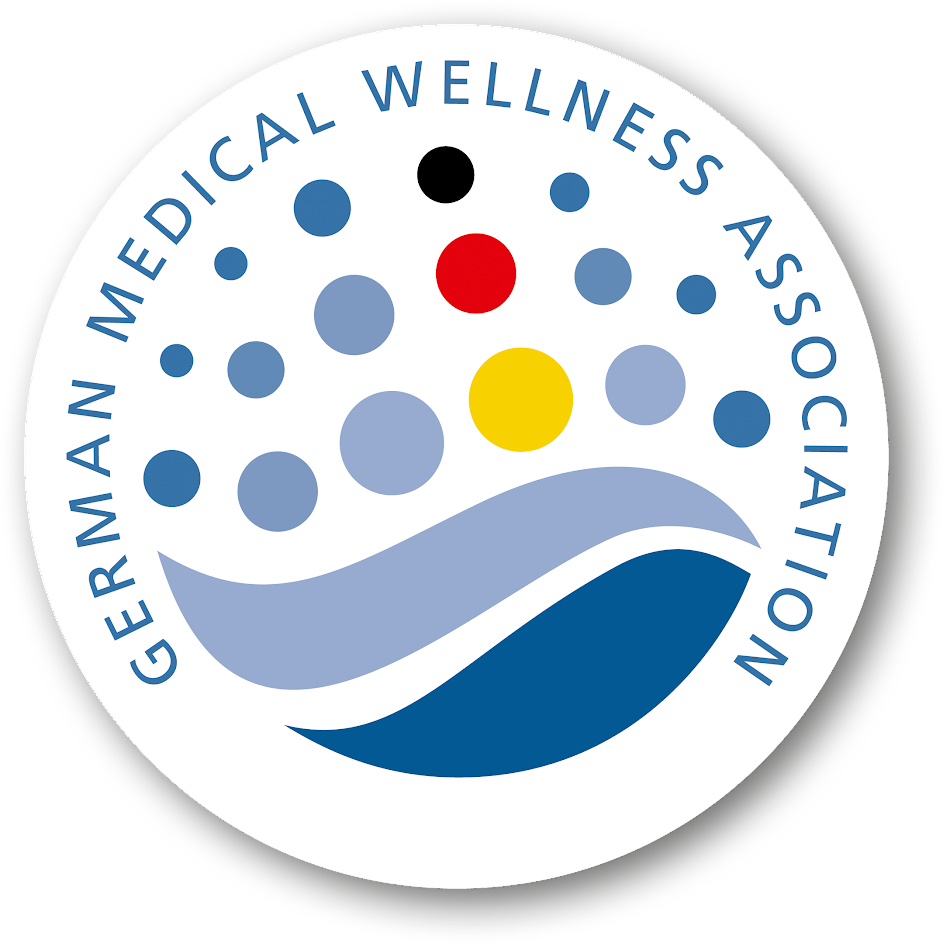
5. What would you say are the key strengths, weaknesses, opportunities and threats for Croatian medical tourism?
Croatia should clearly show its uniqueness and the very good care of the guests and patients, the Croatian hospitality and the Croatian specialties, such as wine and prsut in the foreground, as well as its excellent locations such as the coast, the capital Zagreb and the hinterland - places such as Sveti Martin. It’s important to constantly reflect on oneself, evaluate and set new impulses. Likewise, the international market must be constantly monitored. Croatia's neighbors can become tough competitors. The goal, however, cannot be to reach patient groups, with low prices and the result is the poor quality. One positive opportunity for Croatia in this way, is that it is a small country, so I hope that all stakeholders will work on a ground level together. It gives the chance to meet everybody regularly and can show how important the market is. It starts from the government and will include hotels, resorts, clinics and spas. For the customer it’s important to have a very friendly service and true photos and true facts from the promoting websites.
6. Improving infrastructure and developing projects are key themes of this conference. How attractive is Croatia to the German investment market, and what types of medical tourism investment projects do you think should be the focus?
Croatia, as a "new" member of the European Union with high potential and secure laws, is certainly interesting for investors. Although, as we all know, it’s generally very difficult to address investors or to win them on a short-term basis. In my mind the main goal of medical tourism investment projects, is the developing of Medical Wellness hotels & resorts, with high comfort and with extraordinary treatments and rehabilitation Projects. Medical Wellness is the combination of conventional medical services, like: plastic surgery, dental, eyes, hair, beauty and cosmetics, alternative therapies and offers the relaxation in the traditional spa, as well as massage and sauna treatments, Thalasso-Therapies, Ayurveda, TCM, Kneipp-Treatments, Physiotherapeutic, Detox and more.
The future investment projects should be a mixture of the development of existing buildings and the development of new projects on a very high, modern and sustainable level for medical wellness. I hope that we can develop a common education system for hotels, resorts and clinics.
As a conclusion of this interview let’s say: “Let’s work together and develop Croatia as a Leading Medical Wellness, Wellness and Health Destination, with a high standard of Wellness, Medical Services and Rehabilitation Programs” for its own population and the guests from abroad.
For more details about the 3rd Adriatic Health, Sport & Tourism Forum in Zagreb on October 21-22, check out the full programme here.

To learn more about the forum organisers, including their other initiatives to develop medical tourism in the Adriatic, visit the Medical Group Ltd website.
To follow the latest in the Croatian medical tourism story, follow the dedicated TCN section.

